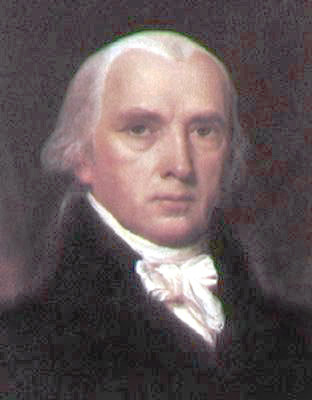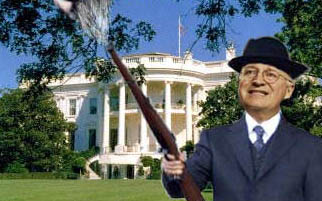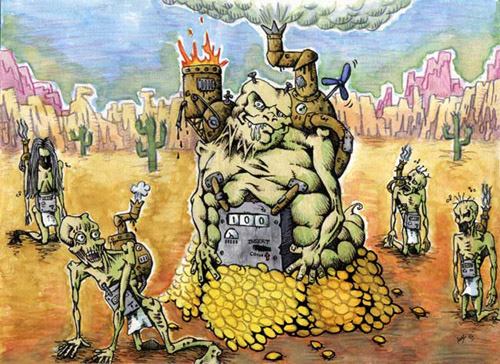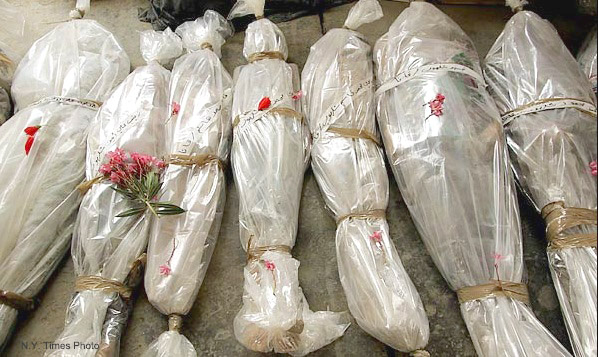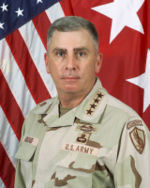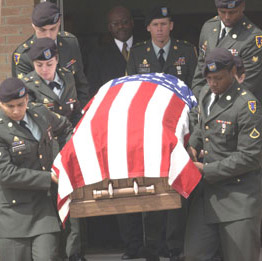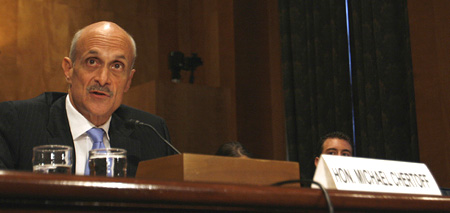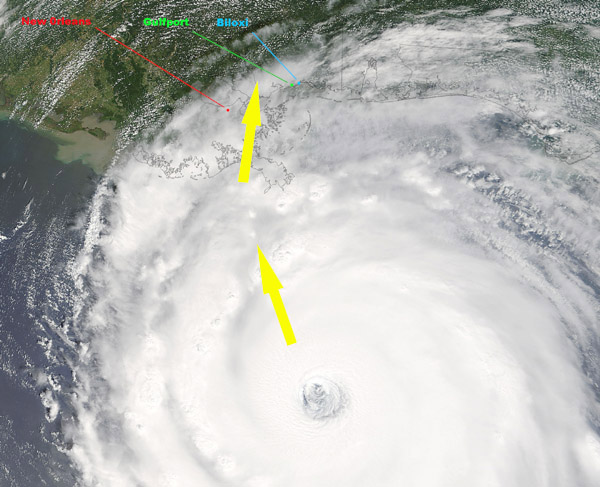







4,593
dead

In 2006, when the Democrat-majority, 110th Congress was sworn in, election-
mandated to end the Iraqi war, the toll of U.S. soldiers, killed, stood at 2,994.

March 20, 2003 - December 18, 2011; the war in Iraq is over, with 4,593 dead.
All U.S. combat troops out, but deaths mount, plus 32,223 wounded over nearly nine years.
Now, in the Afghan war, 2,461 U.S. soldiers have been killed, 20,500+ wounded.

Here, for every 100 deaths Bush-Cheney have brought to the families of soldiers in Iraq is a casket and a funeral.
Bush-Cheney’s failure to end the Afghan war after a quick victory makes them responsible for most deaths there.
















































Is it the price of freedom, visible here, or that of a Constitution, subordinated?
Direct responsibility is now shared by Republicans in Congress, without excuse or equivocation, for
more spilled blood and lives lost in an occupation harmful to the nation, unjustifiable, and unjust.

 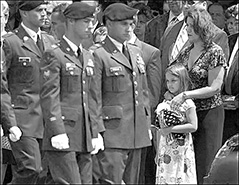  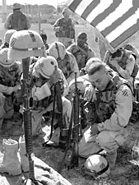 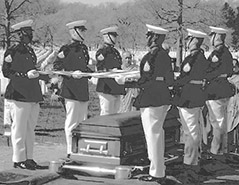  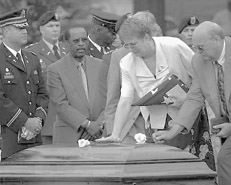   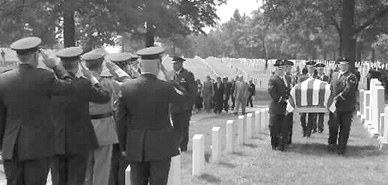 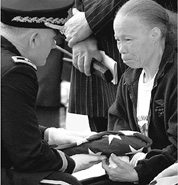 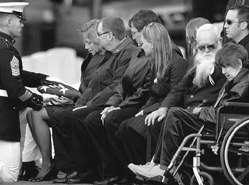 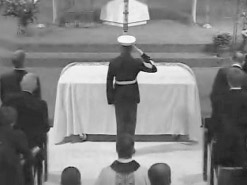 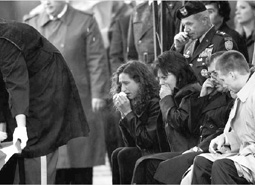  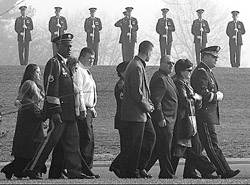   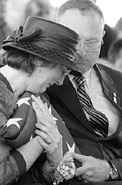   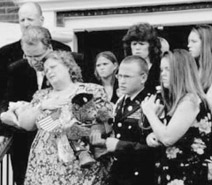     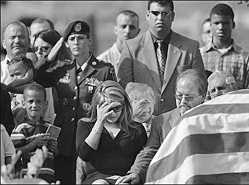 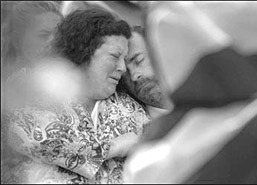 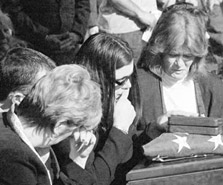 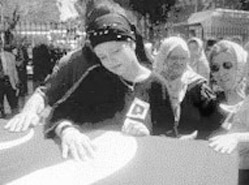 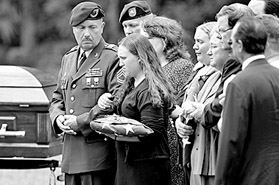  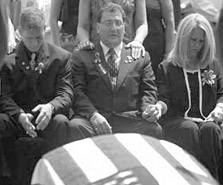 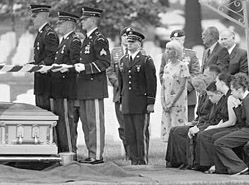   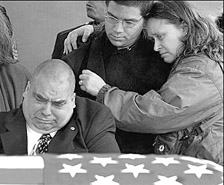 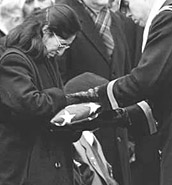  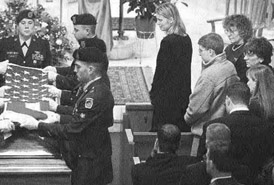   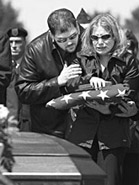  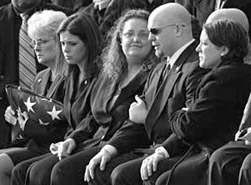 |

An independent judiciary is the dam against tyranny, insuring the Constitution is reenforced by the rule of law.Since James Madison, the chief architect of the Constitution,
and the other Founding Fathers intended that an independent judiciary be a permanent, essential leg of the tripod upon which government stands, that it be dedicated to the preservation of the Constitution and the democratic republic it creates and sustains, politically motivated elected officials who disparage judges or the courts, by word or threat against its independent operation, are, in effect, violating their oath to uphold and defend the Constitution of the United States of America.
On the last day of October, in election year 2006, and for many days prior to that, Bush has continued his assault upon the courts and the Constitution, saying, “For decades, activist judges
have tried to redefine America by court order... Just this last week in New Jersey, another activist court issued a ruling that raises doubt about the institution of marriage. We believe marriage is a union between a man and a woman, and should be defended.” This statement is interesting on several counts: first, it is incorrect. The New Jersey Supreme Court ruled that New Jersey cannot discriminate against gay couples. Discrimination is unconstitutional, and the court leaves it to the New Jersey legislature to fashion a law, be it marriage, or some other approach that does not discriminate. Bush should be attacking the New Jersey legislature for its lack of care in lawmaking, not the court for doing its work under the law—the Constitution. Second, although it would be a simple matter to say, and nearly believable, that Bush is ignorant of legal process under the Constitution, he is not. He is well-aware that the ruling of the New Jersey court can be appealed to the U.S. Supreme Court, where it would undergo additional review and ruling. This is interesting because it points out that Bush has no respect for the court, the Constitutional process under which the courts operate, or judicial review; otherwise, he might have said something along the lines of, “We believe that the New Jersey Court has ruled incorrectly on the law in question, and we will allow the legal process to proceed at the highest level to make a final determination.” Bush didn’t say it, but that would be a statement from a president who appreciates the need for an independent judiciary in a democracy and respects the court system established by the Constitution and the rule of law.
Never mind the fact that Madison and others of the Founding Fathers would tell you that the federal government should not be passing laws on marriage, that it is an issue reserved to states’ rights, and never mind that Bush knows this, as well, since he recently supported an amendment to the Constitution on the matter, the purpose of which would be to move marriage-law from the states’ to the federal authority. Bush’s statement trashes both the court and the Constitution’s legal process. Madison’s words, warning of the abuse of power and the dangers of too strong an executive, leap from history into the breech to cry out that this nation is being threatened by the confluent, destructive circumstances of a self-sedated Congress and an abusive and over-reaching executive. Voters in the next election should take notice, because their action in the last election, decisive though it was, was insufficient to gain the respect or adherence of the Republican Bush administration.
The fact that such threats have been made by Bush and other conservative Republicans in the Bush government, and that veteran Supreme Court justices are seriously voicing concerns about those threats and the perceptions of those who so engage them, and the public, a condition of instability in the constitutional system has been identified that requires correction by means of a constitutional amendment, to further insure the future independence of the judicial branch and the consequent preservation of the Constitution and the democratic process.
The concerns expressed by some justices regarding problems of public perceptions and support are, in part, their own making. It is the Court that mandates it will be shielded from public view in the performance of its business, rather than operate in the sunshine. The reasons for this “private club” attitude are contrary to democratic process, unnecessary, somewhat egotistical, and a dated norm of tradition. Perhaps their more practical concerns about public perceptions, as relates to the valid need for independence, will cause them to reconsider their outdated closed-door attitudes. In this, the time has passed for them to follow the lead of Congress and open the bench to the public eye.
Funding
Funding for the courts should be stipulated to be a fixed percentage of the appropriation Congress authorizes for itself. Funding to enforce decisions must be either automatic or mandated, not a matter of political choice. The courts must not be dependent upon any other branch to be funded or see its decisions set aside by the political funding choice of another branch. The failure to fund the rulings of the Court is inherently unconstitutional, since it renders the judiciary moot, which is the antithesis of the intention of the Founders as well as to any practical, logical means of upholding rule of law or insuring the protections of the Constitution. It is an abuse that has no place and must be blocked. For legitimate concerns on the legality of judicial performance, “good behavior” is a subjective and actionable term that has a proper place in the checks and balances of things.
Appointments Appointments are addressed because the imbalance in the judiciary is also problematic from within. The source of the problem is in the political fever to “load” the court whenever the power in the other two branches changes hands. With such an overbearing priority for loading that there is foaming at the mouth for perceived other-side-aligned judges to die or retire, it is no wonder that among the nine justices and the numerous trial judges there will be loaded some bad apples, resulting in rulings that are contrary to the Constitution, such as the recent rulings that upheld the seizure of private property intended to be turned over to developers under the power of eminent domain, and the ruling that independent citizens have no standing to challenge executive orders that violate the Constitution’s prohibition of laws violating the principles of religious equality and autonomy. Others will point to police roadblocks—checkpoints, a restriction of movement and unreasonable search with no probable cause, which is really a tilt on the balance between individual rights and public welfare, in favor of the latter. Right and rights are not absolute, but a better appointment process will increase the chance that the balances made are on a constitutional scale, not a political one.
Ideally, the appointment process should be free of political influence of either party. Rather, bipartisan panels should be formed to process nominations and confirmations, and I would submit that those panels should borrow from Irish democratic process and also include invited tenured professors of constitutional law, whose assessment of candidates would be more objectively to the point of law and advisory to the senators, oversight to the public.
Alternatively, in those times when the same party controls both the Senate and the White House, appointees to the federal courts should require a greater majority of votes in the Senate for ratification, and/or, the president should be required to make his nomination in concurrence with the Senate majority and minority leaders.
Enforcement If the Supreme Court finds its rulings are not being enforced, it shall initiate a hearing on the charge by notice to the senate which will be answered by the solicitor general. The executive and the senate will each select one judge sitting on the federal bench to join the panel of nine justices. Any subsequent ruling on the hearing by the panel which finds the president to be in defiance of enforcement of the Court’s ruling must be unanimous to be sustained, and must then result in immediate compliance by the executive, an impeachment proceeding to automatically be initiated in Congress upon notice by the Court that such compliance has not been forthcoming, requiring only a simple majority to convict.




When considering the far-reaching, almost prophetic thought of the men who created the Constitution,particularly James Madison, who also sponsored the Bill of Rights,
it is small wonder that their instrument of government has proven to be a viable framework more than 200 years after the birth of the nation for which it stands. Far-reaching, cautious, and wise beyond their time, the words of Madison and others of the Founding Fathers reach across the centuries to guide, in many issues, a nation they would hardly recognize, if their words will just be remembered.
Madison, in particular, held little trust for those in power and was very outspoken in warning that all power corrupts. He was especially mindful of too much power in the hands of the president, despite that he was Washington’s
chief adviser before becoming the fourth president himself, so much so, that when Treasury Secretary Alexander Hamilton’s financial program was selected over his protest, he stepped away from the administration to align himself with Thomas Jefferson because he felt Hamilton’s programs gave too much favor to commercial interests and the wealthy and bestowed too much authority upon the president.
“Listen” to Madison’s words and think of how they apply to today’s incarnation of his government. It begins with multiple expressions regarding the abuse of power, and then goes on to address the careless relinquishing of power in trying times, an issue very much alive with the concerns of the Patriot Act, the attempts by Bush to grab power with his legislative sign-offs, the attacks against the judiciary, and the use of fear to gain support for accumulating ever greater and farther-reaching powers.
“Tyranny” meant the more subtle abuse of the minority by the majority—not so much a Nazi or Genghis Kahn type of violent repression and control, though that would be the possible result of an excess allowed to go too far. Nip it in the bud would be Madison’s strong warning. He went on:“All men having power ought to be mistrusted.”“I believe there are more instances of the abridgement of freedom of the people by gradual and silent encroachments by those in power than by violent and sudden usurpations.”
“If tyranny and oppression come to this land, it will be in the guise of fighting a foreign enemy.”
These quotes of Madison all have bearing upon today’s choices for citizens. And to Bush’s claims—that power in his hands will keep fighting away from U.S. streets—all are a stern warning.“The loss of liberty at home is to be charged to the provisions against danger, real or imagined, from abroad.”“The means of defense against foreign danger historically have become the instruments of tyranny at home.”
“No nation could preserve its freedom in the midst of continual warfare.”
Madison also envisioned the distancing of the government from the people by the induced complexities of those elite who work at its strings. Think of the myriad of codes for taxes and the internal rules that govern process in the houses of Congress, none from the Constitution, that have become as weeds choking and obscuring the cleanly constructed tripod legs of government they now encase when Madison says:
And if ever there was doubt that the Congress has failed in its responsibilities under the Constitution, that it has dangerously ceded its power and its oversight, then look at what the Congress has allowed Bush to do to America with Iraq, from the viewpoint of the words from the Constitution’s supreme mind:“It will be of little avail to the people that the laws are made by men of their own choice if the laws be so voluminous that they cannot be read, or so incoherent that they cannot be understood.”
To senators and congressmen running for office and defending whether or not they voted to support the war in Iraq, the quote above would be Madison’s instruction that it was not the role of Congress to sign off on Bush’s initiative in Iraq. It is for the executive to seek and obtain the initiative for war from the Congress! The inverse of Madison’s stated intent also leaves it to the judgement of Congress, not the president, to decide whether there is or is not cause for terminating a war, as is written in Article 1, Section 8, Clause 11 of the Constitution. The course to war in Iraq is a travesty of power as twisted as Madison would be after rolling over in his grave from witnessing it.“The executive has no right, in any case, to decide the question, whether there is or is not cause for declaring war.” — James Madison
Countering the stance of those who argue the meaning of the Constitution’s War Powers clause from the perspective of presidential power, that declaring war is different from the undeclared use of force, the Supreme Court expressly ruled, in 1862, that the Constitution’s exclusion of executive power to “declare” war also extends to “initiate” without declaration. The presidentialists’ stance that the role of Congress to declare does not exclude undeclared presidential force initiatives because the congressional role to declare was intended simply to be a trigger mechanism for other domestic and international war-related laws is equally invalid. The legal basis against this view and against the president’s sole authority without congressional declaration is also supported by the Founders, especially Madison’s expressed caution against vesting too much power in one person, and there is no more affecting power than the direction of force of arms, which is assumed to follow a declaration, and which the president is then authorized, by the larger body of the minds and hearts of the elected representatives of Congress, to conduct. Who can contrive or construe that the Founders, so fearful of the power of force they saw so ruthlessly directed against them by England’s King, would ever conceive to construct a government where that power, for domestic or international purpose, would ever again be vested within one man to threaten? No, their words and their Constitution bars that, even in the case of an authorized use of force by the president to counter an attack (defend), where, the attack suppressed, any extended, continued use of such force to pursue the enemy would only be constitutional when authorized by Congress. The further specificity with which the Constitution withholds related war powers from the president (Marque and Reprisal, and the Captures Clauses of Article 1, Section 8, Clause 11), vesting them, as well, only in Congress, reinforces the intent of the Founders that all powers of armed conflict, save initiating immediate defense responses, be so specifically and solely within the power of Congress and not the president. In Iraq, there never was any element of the 911 attack forces, present or directing, against which any defensive-initiative authority could have constitutionally applied. And look, there, at the death and mayhem, and at home, the resultant damage, grief, and sorrow one man’s abuse of such power has wrought, as the Founders knew it could!
And to the conservative Republicans and their moral right, Madison has left this:
It goes on and on, gems of wisdom, gifts from American history,“The purpose of separation of church and state is to keep forever from these shores the ceaseless strife that has soaked the soil of Europe with blood for centuries.”
from Madison, Hamilton, Jefferson and a host of their associates, for whom there are no peers, words that speak to a living government from the long-dead genius that created it. Who is there, besides Bush, Cheney, Rumsfeld et al, who can say America would not be much better off if the actions of its elected officials were guided by the words and warnings of these men rather than by so much self interest? If they choose not to listen, then the choice still remains for the citizens to listen and to vote accordingly.



All good sportsmen knowthat you never shoot unless you can see and know your target. The vice president obviously hunts with the same clarity, foresight, and concern for harm as was employed when shooting from the hip to send troops into Iraq.
State of the Union
Isolationism? Bush uses the label merely to deflect and disguise the ugly truth that defines his actions in the White House. Every statistic that you can assess, in business, foreign exchange—both cultural and educational, diplomacy, aid and volunteerism, points to America as a nation deeply involved in the world. In Bush’s context, based on his record, isolationism can only mean refraining from the unnecessary and unwarranted use of force and from giving away American jobs.




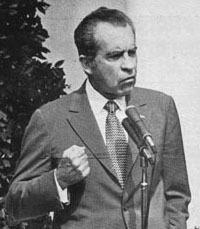
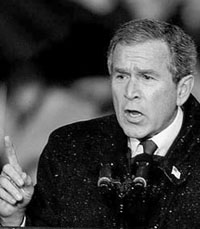

Let no one think for a moment that retreat from Vietnam would bring an end to conflict. The battle would be renewed in one country and then another (1965). ~ And throughout this entire long period I have been sustained by a single principle: that what we are doing now in Vietnam is vital not only to the security of Southeast Asia but it is vital to the security of every American. — Lynden Johnson, 1968.These were quotes of fictional prophesy, not fact, repeated again and again, along with, “...so that they shall not have died in vein.”For the future of peace, precipitate withdrawal would thus be a disaster of immense magnitude. A nation cannot remain great if it betrays its allies and lets down its friends. Our defeat and humiliation in South Vietnam without question would promote recklessness in the councils of those great powers who have not yet abandoned their goals of world conquest. This would spark violence wherever our commitments help maintain the peace... Ultimately, this would cost more lives. It would not bring peace; it would bring more war. For these reasons, I rejected the recommendation that I should end the war by immediately withdrawing all of our forces. — Richard Nixon, 1969.
To withdraw would be betraying our friends. ~ We will continue the fight of those who have already died so that they will not have died in vein. ~ We’ll complete our work in Afghanistan and Iraq. An immediate withdrawal of our troops in Iraq, or the broader Middle East, as some have called for, would only embolden the terrorists and create a staging ground to launch more attacks against America and free nations. — George Bush, 2005.
How do those statements of politics and public relations measure up, ring true, against the other historic quotes of truth, determination, and heart that you remember?
“Allow the president to invade a neighboring nation, whenever he shall deem it necessary to repel an invasion, and you allow him to do so whenever he may choose to say he deems it necessary for such a purpose—and you allow him to make war at pleasure.” — Abraham LincolnLeaving Iraq would not emboldening the enemy, who would need only look to Afghanistan, which is where outsiders in Iraq would go, or to Iran, if the U.S. invades and remains; nor would it be running from a challenge, or cutting and running. Nor would it, as Rumsfeld stated in Senate hearings, cause Iraq to become a breeding ground for terrorists, since, under a sane program for U.S. security, any such policy by the regime there would, they would know, result in their removal by U.S. forces, without the burden of troops remaining to build nations or corporate playgrounds.“Conquest [take possession of by force, as after an invasion] is not in our principles. It is inconsistent with our government.” — Thomas Jefferson
“That’s one step for a man, one giant leap for mankind.” — Neil Armstrong
“Can’t we all get along?” — Rodney King
“I will return.” — Douglas MacArthur
It would be allowing the U.S. the capacity to focus on that which really threatens its future and security.
It would be correcting the criminal transgression of invading—no matter that the regime was an immoral dictatorship. It would be correcting the mistake of, once that regime was removed, remaining after the sweep for WMD and intelligence was complete.
And it would be relieving those, and the families of those who have already died there the burden of being a magnet—another self-motivated administration excuse to justify more unnecessary deaths.
Ethics, dirty tricks, truth and lies?Bush knows everything... but doesn’t understand it all.
Cheney knows and understands everything.
They will both do Nixon impressions.
“I am not a crook!”
Bush continues the policy of hijacking the media mantle to gain unwarranted credibility. Both the use of the Recovery Channel by F.E.M.A. and the selling of material to the Iraqi press by D.O.D., without source disclosure, to create a deceptive outlook on reality, are repeats of a tactic described in the first-term report on Bush below, that has been a standard unethical practice. But, oh, how the lies we weave... and the saying was revealed true when another lie fell away, exposing an inescapable piece of damning logic. The late August 2005 concession by Bush, most recently confirmed by a September 2006, classified, 16-agency NIE (National Intelligence Estimate) report, was that he has turned Iraq into a training ground for the radical-Islamist Army of Jihad (he didn’t give them that title; “insurgents” has been the word), a long-time criticism he denied, played down, underestimated and ignored. And he also said that the experience gained by [the Islamists’ army] coming to Iraq will threaten the West beyond the occupation of American troops there. This is an admission of a truth that he knew as soon as the first critic brought it up. And now, it is impossible for him to continue repeating the fall-back-from-WMD reason for the invasion: to fight for the freedom of Iraqis from insurgents, who are only a small segment of that multi-national mix of zealots. But, he probably will continue to say that he fights for freedom because the phrase is so high-sounding. So does another deflecting justification from the past, another Vietnam oxymoron that he has already fallen back to, uttering it before a VFW group, in late August 2005: that continued deaths will justify the unjustifiable deaths already on his hands, the We will continue the fight of those who have already died so that they will not have died in vein. Carrying forward the logical extension (truth) of a mobile, imported army into his rhetoric is proving problematic for Bush. He blatantly ignored the lack of connection between what he says and what the truth of fighting the admitted mobile army of jihad is, when he tried, also, in August 2005, to argue continuing to waste troops in Iraq, saying “The only way to defend our citizens where they live is to go after the terrorists where they live.” For an enemy that goes after America wherever it occupies, that is a non sequitur. It is patriotic, sloganistic, emotive propaganda.
But in his speech, Bush ended a laundry list of already mentioned reasons to keep troops in Iraq with “...building strong allies.” That is the closest thing to the truth that is likely to cross his lips. But it is code for installing and influencing and benefiting from a politically and economically friendly regime, which in the case of Iraq will require troops to maintain. Building allies is in America’s diplomatic history, not its military history, unless you consider the good will that soldiers are always willing to extend to the people in places they must do their jobs. The troops in Iraq are far too much at risk to indulge freely in that infrequently presented opportunity to play that gratifying role. And most important, building allies is not a justification for invasion and the death of 4,593 soldiers. It was a busy day for Bush-speak.
“Iraqi Freedom” and “Enduring Freedom,” the names of the military missions to install Bush’s corporate-friendly regime, are also noble-sounding lies. Bush took the Iraqi’s freedom away when he ordered the troops to remain in occupation after it was “confirmed” there were no W.M.D. The continued presence of troops cannot be compromised or contorted by Bush to support any motive not based in greed. But that compromise is already showing its head in the media.
A speculative, Lou Dobbs closing question to the intro of CNN Newsday/Newsnight broadcasts that opened with the story about the second set-back of the Iraqi constitutional conclave was, “Will it [Iraq] be the place we went to war to create?” Where does a question and assumption like that come from? Are CNN and Dobbs Bush spokespersons? Bush was not given license to invade Iraq to create a place of grand expectations for Iraqis. Troops were sent to remove a threat to America. That was their legitimate purpose, except that it was a lie.
Another broadcast, NBC, preambled a report on Nightly News, questioning the attaining of “lofty” going-in expectations for Iraq. These reports fail to note, first, that the troops accomplished their mission with spectacular result and equally spectacular low casualties. The best of “lofty” expectations were realized when the head of Saddam’s statue hit the pavement. The hell on Earth in Iraq, and in the homes of dead soldiers’ families, that has existed since that day is the “creation” of Bush, and there never was any expectation from anyone, with a rudementary memory of what happened after the Soviet Union invaded Afghanistan, that there would be no good expectations if occupation was to follow, and no expectation, aside from defense, provided the needed, illicitly gotten, public and conditional Congressional consent. Where ever this untrue, “commentary” segment to the news about Iraq comes from, the only “lofty” expectation was to make America safer, remove a rogue regime and its weapons. Freedom would follow that, without Bush’s greed and the occupation it subsequently requires. 4,593 lives were not sacrificed for these media-voiced, post-invasion, imaginary expectations. Those soldiers went in believing, above anything else, that they were going in to remove weapons that threaten America and the regime responsible for them. There is no other, lower, standard that would be accepted by them for risk of life, unless it was humanitarian, and in defense of life. The media helps Bush to lower the standard for putting troops on the line when it speaks in any way toward motives, or advantages, or benefits of any use of force, for any reason, voiced by anyone, especially Bush, that does not rise to the level of humanitarian salvation (defeating a regime that is causing an ethnic segment of its population to starve to death, or murdering same) or national defense.
In August 2005 speeches, how did Bush gain credibility, or answer for the consequences of his greed, or justify extending those consequences with more death by making obvious statements of description that even the militants who killed the soldiers realize: “each of these [dead soldiers] left loved ones and families at home.”? Because he realizes this, it certainly doesn’t mean he has any qualms about continuing it. Before this, Bush had never mentioned the deaths, instead, burying them, again and again, to avoid the ugly meaning they finally bring to his words, and the cost he can never justify or explain away with slogans and hollow echoes from the past. This was pathetic pandering to the emotional pain of families of dead soldiers, to gain support and to lead into the old "they had a legacy that must be preserved by continuing so it won’t be lost" reason to spend more lives. The continued service of soldiers in Iraq is a disservice to America, a service to al Qaeda. Greed knows the harm it does and cares not of the values it destroys to meet its need. Here, Bush is only deflecting, hiding greed’s face behind other obvious truths with old, dead-ended statements that say nothing, demonstrate no worth for the losses or reason for them to continue.
Prior to mid-August, Bush’s P.R. line to justify troop deaths has always claimed that the “enemy” was there to be defeated. Now he has admitted that the “insurgents” are there because they came to confront the occupation force that remained after Baghdad fell, which critics have always said was the reason for the calm period immediately after: the Islamist army was en route, infiltrating from all over the Arab world, setting up, supplying, and Bush is also finally saying that no matter where the troops go, Iran, Syria, this army will follow them. But Bush is now ignoring this with his contradictory and manipulative rhetoric.
Perhaps, some general defining of “insurgent” is in order. An “insurgent” is resistence or rebellion that rises from “within,” so as has always been said, there is no insurgency. There is the army of Allah, the radical Islamist’s army, the jihadists, which is a force from “without.” And Bush has now acknowledged them. But an important thing to note, as it relates to other lies used by the administration to drum-up, with threat levels and warnings, and use fear, particularly the “fight ‘em over there or here” variety, this army has no navy. And Bush would like nothing better than for Americans to believe that operations in Iraq are turning up intelligence that prevents attacks in America. Any such, unsupported, claims must be taken, from Bush administration sources, with a molecule of salt.
More lies and hopefully, forever, a very tired slogan, are cast aside.
Another evidence for the treachery of 4,593 dead is confirmed. How the fabricated story Bush has been spinning is changing, as the truth becomes impossible to hide. It could no longer be said that U.S. troops were being so confronted and hampered and bled by a mere local rebellion.
Whether he knows it or not (and his death-of-logic statements indicate he does not), when Bush admits the enemy is really an imported, regional-mobile, army of infiltration, he also admits that, like WMD, there was no enemy to fight for Iraqi freedom after Baghdad fell, and that he could just as easily be killing them, Jihadists, in Iran “for freedom,” where there is a threat to America, but he isn’t doing anything about that. Why not? Shouldn’t he just move on as has been argued, forcing the jihadists to disburse back to their countries or Afghanistan? If Bush does go to Iran, they will have to go to Afghanistan or wait until the Iranian military is defeated before they begin to fight again. So why keep the troops there in Iraq, to keep dying, if instead the dying could be temporarily suspended until the search-and-destroy phase of a possible Iranian action, and the same jihadists dying now would begin dying again in Iran, as will also begin the attrition of American or coalition troops, but at least they’ll be dying in Iran to get something done that America and the West needs to get done. The only thing there ever was in Iraq is the wealth, and that’s what the dying has been all about, there.
Bush’s greed, which brought him and a death toll of 4,593 soldiers to Iraq to build a corporate-friendly regime is keeping him there to try and finish putting it in place. Then, and only then, will his greed permit him to turn to Iran for the same black gold bubbling up there; oh, and coincidentally, also remove some bad guys and their nuclear, chem, and bio-weapons programs, so that when he says he invaded Iran for American security (and freedom for anyone), it will at least be a half-truth, but putting in the new corporate-friendly regime will be the driving force for remaining there. But, America will no more be able to afford remaining there than in Iraq, and if Bush keeps troops there, the same things happening now will be replayed there, during the search-and-destroy phase, and if troops remains in Iran after WMD are removed, the lives lost from that point on will be as uselessly thrown away for the greed of Bush and his circle as they are now.
Bush’s admission of the imported army, combined with his manipulation of intelligence data, his criminally negligent determination of a threat to America’s interests (not industrialists’ interests) to justify an illegal invasion, backs Bush and his circle into a box where greed and 4,593 dead troops are their only company.
All of the P.R. and spin and patriotic slogans in the world can’t change that.
On August 11, 2005, an Iraqi-citizen pilot was buried in conjunction with U.S. Air Force pilots, the first Iraqi citizen to be interred at Arlington National Cemetery, which is space-limited, despite its recent acquisition of additional acres. A smart move by the administration, made to re-enforce it’s political, public-relations storyline that the Iraqis are somehow tied to America’s people. Iraq has been tied to America’s problems (America as much to blame), and now it is a ball and chain that, because of the resistence Bush is forced to counter—the kind of fight he must have American troops fight—in order to force his corporate-industrial blueprint for the Middle East (and anywhere else in the world) into existence, has the potential to bring the ultimate disaster upon the West, because it detracts from attacking the real threats that are actively seeking the capability to use America’s most terrible technology against it. That is not a remote-possibility threat. Remember that the militants have already been successfully using very sophisticated communications technology in command and control as well as finance.
None of this invokes any disrespect at all for the dead Iraqi pilot, who was an obvious aid to America’s soldiers in the most critical times, performing his duties in their interests with the same courage and dedication that is characteristic of a U.S. flight officer. But Arlington is a poor place to choose as a political, public-relations tool to make synapsis links in the public mind between the Iraqi and American people that don’t exist, except for very rare exceptions, as this honored Iraqi pilot. It is a poor choice to use the nation’s cemetery as a P.R. tool in any case, but it is only “as usual” for Bush’s administration, as evidenced below. It is not an ethical problem at all for them to create the possibility, with the approval of the possibly dreamed-up application (Hey, Scott! Scott McClellan! Go find some dead Iraqi soldier that died with our soldiers, who was on our side, and we’ll put them in Arlington together. Make sure it gets high coverage.), meaning, go out and find the circumstances that fit (a lot of dying going on to look through) and do it; or it was just a windfall, leaving them only to draw-up the news release, and then make sure it gets to the media outlets with a stressed priority. Very smart. Subtle, too. It makes you wonder why they were not so clever to prepare their public-story path into Iraq. But mistakes, unlike birdshot carelessly peppered into a friend’s skin, (4,593 dead) and consequences (4,593 dead and climbing fast) are hard teachers, and this is an eloquent display of public-communication manipulation.
But if this is the quality of deceptive manipulation that you get after the mistake, be very afraid of the creative uses that will be dreamed up if they ever suffer the consequences, given the chance. The past attempts have been bold, but the latest Republican-delivered D-Day simile insults. Remember that this police action in Iraq started with Bush as an illicit war and is not to be confused with the war in Afghanistan against the Islamic militant leadership, which actually began long before Bush’s response to 911, and which should immediately be expanded to remove the regime in Iran, if they do not quickly dismantle their WMD and accede to unrestricted inspections. But Bush is still using all of the long and far-reaching tentacles of government to control public perceptions, instead of focusing them on the real threats.
Also in August 2005, Bush held an unremarkable press conference in which he used his familiar sophistries, repeating his latest reason for troops being in Iraq, adding: “The main condition for removing troops is the capacity of the Iraqi military to take the fight to the enemy.” An enemy he in August 2005, finally admits will fade away or follow if he abandons the nation-building and troops pull out, leaving nothing for the Iraqis to fight. His lie is confirmed to be both misleading and faulty, because if America were not there, nation-building for his economic goals, there would be only Iraqis fighting amongst themselves for their national power. He also used the same, false disengegement-bolsters-enemy justification that two presidents before him used to justify continuing to pour troops into the stinging failure of Vietnam’s extended, French-abandoned civil war, for which America still bleeds. Actually, the reverse is true. The Islamic-militant leadership which uses the U.S. in Iraq would be impressed and worried if Bush started acting in the national interest instead of the interests of his agenda. They count on his greed-driven motives. These attempted defenses for the indefensible are Bush’s pure line of propaganda, the same false claims used to answer the swell of opposition to Vietnam. It was wrong then, because although corporate-expansionism has begun to take hold, Communism hasn’t taken over Asia, and it’s just as wrong now, and now another lie has been admitted.
The militants kill because Bush is there trying to gain influence over their land. They have motives more substantial than those Bush told reporters to evoke emotion. How can they “drive free nations out” as Bush lies, when there is no nation there, except America, trying to bring Bush’s puppet show to life. Because no matter who is in that government, they will be the industrialists’ boys, because the U.S., under Bush, will guarantee their existence so that they can keep on fueling the economic engine Bush builds. If anyone believes that the high-and-right-sounding lies Bush uses to justify his crime represent the true motives and reasons for the soldiers dying, they would find the castle at Disney World to be a comforting home. The mid-August 2005 admission of the true nature of the force opposing America’s toops in Iraq should dispell such fancy.
Another sophistry of Bush’s, is that America owes anyone in Iraq anything in order to be able to “betray them,” as he says would be the result of leaving. This is just as false as the rest of his out-of-storage responses to the present state of the situation. America OWES Iraq nothing, so no one can be betrayed, except, under Bush, America’s own people. Iraqi revolutionists were betrayed, years ago, when there was the hope of a revolt, because the rebels were made promises that weren’t kept. That was then. This is now. The only promise made was to use force if Saddam ignored non-proliferation demands, and as the evidence demonstrates, he did not ignore.
Until that mid-August admission of the nature of the real enemy in Iraq, according to Bush, everything was rosy and getting better, like Vietnam, yet meanwhile, oddly at counter with that... contradiction, the troop numbers are going up, not only in death, but also in deployments, and why? Because as the pressure on Bush to stand down increases, the need of greed also increases the pressure to get the system in place that keeps the money flowing, on the bet that if the government can at least be installed, Bush will then be able to claim that freedom has been brought to Iraq and America has a new partner for freedom and growth in the region, despite that assassinations of government officials will be continuing, that government will be housed in a fortress bristling with guards and barriers and barbed wire, and despite that the bombings and deaths and deployments will continue rising. Of course, the admission that there was no enemy to defeat inside Iraq cancels the ability to continue saying freedom was or will be brought to anyone.
Circle of Greed
Bush will still use any slogan, any appeal to blind patriotism, any deceptive spin on any fact that his circle comes up with to keep the troops in Iraq and the money flowing, and their plan has the reward of vast amounts over a long period of time, worth any betrayal they can devise and disguise to make it happen, considering their motives. It would be easy to ignore and accept, except that in their greed, and their betrayal, they went in illegally and are paying to gain their cash cow for the future, and perhaps a crack into spreading it beyond Iraq, with the lives of the average citizens who die in uniform to do it. Continuing to remain, when the magnet-effect reality has been conceded, both confirms the crime and reveals the greed.The Bush push is to mine the treasure in Iraq with the lives of front-door-protester Sheehan’s son and the sons and daughters of other grieving parents, who matter not an iota to him or his gang of industrialists, who in the past drank 22-year-old scotch in wood-paneled club rooms, paid for with the sweat of coal miners, and lives lost to unsafe mines and black lung, and murder in the Colorado coal-field war with the Ludlow Massacre,
abuses which only were curbed when the working class of that early industrial period finally created viable unions and took absolute control away from the greed-driven, wealthy elite who used them. And before the miners, the industrialists did the same with the rail workers. Now it is done in far-away sweat shops, using children, under the guise of contracted foreign factories.
Those abuses are history, documented, and they are reality today. Greed does not die or fade away.
If Bush Senior’s decision not to take Baghdad the first time out seems a contradiction, it is not. It correlates. The decision to play patty cake with Saddam was wrong from the very beginning. He invaded, he forced the West to arm and mobilize against him, and his army should have been pursued back to its highest commander, there and then. That’s the cost of starting a war and should be the objective of finishing it. But Bush Sr. didn’t do it because that operation was under U.N. sanctions, and they wouldn’t have politically been able to set up their own sandbox. The invasion of Iraq by Junior was probably a father-son discussed, “if we get you elected, we may be able to...” type of contingency plan ever since, one that will never appear in the post-term library being contemplated now.
Like polo, or the foxhunt, chess is a game of pride for the corporate-elite/industrialist; planning ahead to take the board. So do politics and military operations plan.
And history records. History is a gift for a better future. It is a guide and a map that says, “Here, take this, your civilization’s journal, and look for what has failed and what caused the failures of the past, and watch carefully for the signs that it begins to happen again.”
Reject that gift, and you have another Nazi Germany, where history shows that people who were officials of the highest respect and position aided Hitler in taking that nation’s power to serve greed and hate, if not by their delusion or active support by word and action, then by their passive compliance and silence.
Nothing has changed. That selfish and abusive industrialist elite is alive, and has grown from the largest interest group and lobby in Washington into the heart and soul of America’s government, alive inside Bush’s circle. And, where else is there to look, in the highest and seemingly most unlikely places of trust, for the boundaries of Bush’s Circle of Greed? Look first where there is the greatest power, the greatest capacity to assist or defeat the desires of the Bush-lead military-industrial complex and stand up for soldiers’ lives: the powerful senator and chairman of the Armed Services Committee, John Warner. How do the actions and words of this senator, with an impressive military background, fit in with the administration line of manipulated and spun statements of policy and justification for Iraq and the killing?
Senator Warner is at least guilty by what he hasn’t done.
Or, look to Virginia’s Republican senator, George Allen, who even after the admissions of the mobile, jihad army were made by the White House, justified the invasion of Iraq by equating it to D-Day, in an attempt to support the philosophy of greed in Iraq upon the courageous, do-or-die strike to break through the Nazi wall of Hitler’s Fortress Europe! Allen’s statement takes the award for outlandish spin and patriotic-synapsis manipulation away from any that Bush, Cheney et al ever released since they began raining their propaganda in such magnitude on the people and allies of America that the likes of their volleys hasn’t been seen since Hitler’s V2 rockets and bombers rained terror, death, and destruction upon the thick-skinned and unyielding British.
Senator Allen is guilty by support of word and association, alone.
Look to Utah’s Republican senator, Orrin Hatch, who is so deeply sewn to the Bush cloth that he can find no fault with the Bush administration’s preparation or response to hurricane Katrina.
Senator Hatch is a religious rightist, who indulges in the fineries of life, and is guilty by the hypocrisy of his inhumanity.
The former, indicted, Republican majority leader in the House of Representatives, Tom DeLay (Texas), has been the most effective of all in deflecting criticism and accountability for the do-nothing response away from Bush. On September 6, he turned the question of Bush accountability, for the rout of civilization in New Orleans, on its ear by praising the performance of the FEMA and first responders’ rank and file, knowing full well that it is not the rank and file relief and rescue workers, or FEMA workers, who are being blamed for the tragic, even callously negligent lack of response by Bush and his appointees; yet DeLay stains that rank-and-file, by association, with the failure for which he uses them to spin an answer.
Congressman DeLay is a guilty party to Bush’s Circle of Greed by his use of the good to shield the bad and the ugly, and by being the hub in a multi-spoked wheel of connections to Republican abuse and corruption and consequent legal proceedings.
The Circle of Greed extends to the courts, as well, where rulings in favor of the corporate-industrialist blueprint include the increasing “economic” basis for upholding eminent domain, which is the method by which that blueprint avoids its own commercial premiss of supply and demand. This segment of the blueprint, that also operates in Iraq, seeks to use the government to take property at their price, instead of the market price, because in almost every case, the owners whose rights are being brutalized would have sold out, but only for the right price.
And in the forefront of court issues is ethics, where Bush’s Supreme Court chief-justice nominee, John Robert’s failure to recuse himself from ruling on a case, in which Bush was a defendant, is being defended by Republicans on the basis that there is no requirement for judges to do so when being considered for higher positions. “No requirement” was also the reason Justice Antonin Scalia (former counsel in Nixon’s administration) used in the Bush energy-meeting case, where he also failed to recuse himself from hearings in which he is historically and politically biased in favor of administration case parties, where recusal is a requirement because only that removes the possibility for “beholdin’,” since standards of law applied objectively is the ethical standard, and although Bush and his circle do not demand ethics, the American people still do.
Bush’s circle also attacks the American working people. The unions are diluted and made more ineffective by the off-shore export of jobs and plants and the tumbling salary scale, and anything that’s done to preserve a minimum quality of life for average Americans is done because now it’s the law, but Bush is changing those laws as well, and the American troops are, to them, no different than the coal miners were to the mine owners of the early 1900’s; theirs to abuse and use to gain wealth upon wealth. The only way in which anything good can be seen coming from the continuing death of troops in Iraq is through the eyes and motives of greed.
The motive behind Bush’s determination in Iraq, no matter the cost in average taxpayers’ funds and lives, is very clear when you consider that the ambition of the corporate-industrial lobby that controls the White House is to make the world into a house of cards where they hold all the aces... and the jokers, and Iraq, with its oil and cheap-labor resources, will make for a profitable playground if the politics can be surmounted and controlled, and that’s what’s costing lives and the misuse of America’s various resources, not national security. Bush’s Circle of Greed is using this America and its troops in Iraq to expand and grow the corporate-industrial design of his circle, his base, and that theology has no national allegiance. Its allegiance is to the dollar, and share price, and the profit margin, and to the control of the economic power to dictate the way people will live and work. Bush is a thief, stealing lives and the future of America by squandering its resources, created and maintained for national defense. There is no national defense involved with spraying lead through the heads of “insurgent” after “insurgent,” sent there for that very purpose. There is only the Bush expansionist agenda. That’s what is being bought with the soldiers’ lives he abuses the power of his office to spend.
Media, a most-prized asset, was among the early long-term priorities in the chess game, removing controls that leave too many media markets in too few hands, easing the ability to increase influence over thought and culture. Thought control is the P.R. of Bush’s politics... and of greed. When Bush or McClellan speak about the freedom of Iraqis, and their ability to market their oil, and to have power and roads and... freedom (always tie the word “freedom” to the list in order to re-enforce the connection, because “freedom” is the lynchpin, the key word, the emotional lever), they are already beginning to subterfuge a belief by the public that the corporate-industrialist motives for themselves and America (they won’t include themselves in the speech) is worth the death of troops, worth making America into an aggressor nation, and worth risking the detonation of a nuclear device in a Western city. That will end the final argument.
Subterfuge, Baseball, and Bush + Cheney = Don’t Impeach
And why should this circle of abusers and fast-talkers in the shallow end not try to argue their real truth? Why should anyone be impeached, tried? Baseball players who violate their trust to their fans and the game with drug use are forgiven, allowed to keep on playing, perhaps a slap on the wrist, while Pete Rose, who messed with the money, corrupting the odds-making for gamblers in the game, hit them where they live... Yeerrrrrr OUT!!! But, baseball abuse doesn’t betray the trust of spent lives; or, does it? In the case of any fan who took drugs to play the game and died, it does!
The values by which Baseball judges crime cannot be allowed to become the values that judge crime in government. The spin-kings and power brokers believe that the science of media and public relations can pave the path for their Iraqi project and the means by which it was put in motion, and that it can answer for the lives it will cost. And if Baseball is any judge, with no protests at the gate, the fans accepting the lack of example made to youth, the devalued, already date-split stat record, and the thinking that says athletic ability is more important than moral value and fair play, then the circle of greed in the White House will get away with it, and the useless dying will continue, and America will continue to regress at every level—except the part that gets leveled by the bomb that Bush is letting the Iranian’s try to build now. It’s difficult to set the stage to present the threat, to make the priority, and enforce the demand for compliance by these rogue nations to the terms of America’s non-proliferation policy, when you are so busy trying to set the stage for the enduring flow of billions of dollars in Iraq, while you still can, and avoiding the growing call for explanation and accountability.
Bush and his circle should pay Doorstep Sheehan and the other parents who also looked to their sons for their future, an annuity, personally, for the rest of their days, for starters. Remember that this woman has always represented more than just one parent. And Bush knows that what he says to her, he says to all others. Bush’s refusal to face her is a result of his greed, because facing her means taking accountability, face-to-face, with all the victims of that crime. It means confronting his inner self and the victims, directly, for the true reasons her son and others died. It must be somewhat, at an extremely elevated level, like the scared, precocious kid who busts a window and is called to answer by the angry shout of his father from within the house, knowing he is determined to lie and say he didn’t do it, because Bush knows he can only lie, saying the same things from the political bag of reasons that laid in the Oval Office closet across from Johnson and Nixon, where Cheney, Rumsfeld, and Scalia also lurked. And Bush’s PR people know, even if the old bag men don’t, that old baggage doesn’t fly and can’t be reused too often, especially without qualifying it, which is impossible to do. His only other alternative would be to tell her, as a consequence of the guilt for the deaths that overcomes him, the real reason, knowing that she would attack him and claw his eyes out. But it is unlikely that Bush’s kind of people (affected by grandiose plans based in greed) are capable of feeling guilt, any more than the fat-cat industrialists of the early 1900’s felt guilty about coal miners who fell dead and were regularly buried all around them, from black lung and cave-ins, while they comforted themselves in the excesses of their wealth.
The first rule of public relations (Bush PR, not ethical public relations) is a modified parrot of the old proverb, “If you have nothing good to say, [lie or] say nothing.” This is the rule now in effect with Cindy Sheehan, and she already has Bush on trial for the criminal invasion by being there in his face without having to take on the IRS to attempt legally trying his administration.
Bush being impeached leaves Cheney... with more adverse determination and no change for the good, so the only way to end the useless killing and look to the, possibly, necessary killing, is to apply so much pressure to Congress that it takes action to bend Bush away from Baghdad and toward Tehran, and there are, thankfully, signs that this has begun, and Bush is becoming more desperately unrelenting. But Bush will be easier to bend then Cheney, and when the term of this administration is over, there should be severe accountability, not libraries.



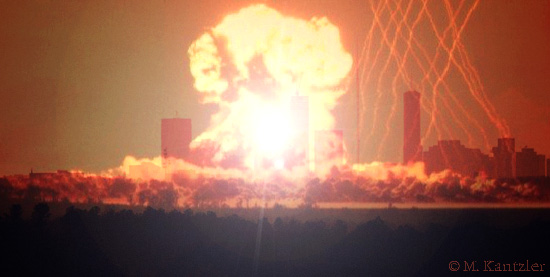
Graphic design/FX by Silkscape Arts
 What Bush’s beliefs will bring—homeland devastation, fissile or dirty.
What Bush’s beliefs will bring—homeland devastation, fissile or dirty.

The Nuclear Enemies — Not in Iraq

The words Bush spoke that didn’t wither in the blazing, summer, Texas sun at that mid-August mini-conference, were that it is the president’s responsibility to console the families of dead soldiers, which he hasn’t, and that the effort of the troops has been “incredibly noble,” which of course, with few exceptions, it has been, in Bush’s wholly selfish cause. But every soldier who has died worthlessly in Iraq for the greed of Bush’s circle would pick themselves up out of their graves and march right into Iran or North Korea to die again for the goal of removing those rogue regimes, their criminal, petty, greed-mongering leaders, and ridding America and the world forever of the WMD non-proliferation threat that they represent.The newly released, largely classified, National Intelligence Estimate (NIE) report extends its previous-year report’s countdown to Iranian detonation of a nuclear device by double, to ten years. With North Korea much closer, the perspective on the lack of priority given the W.M.D. threat by Bush is dim, when considering that, on August 20, 2005, General of the Army Peter Schoomaker told Associated Press that the Army is planning for more than 100,000 troops to remain in Iraq for nearly half that time! That was 1,900+ lives and counting, plus four more years, or ten, while the real enemies are left...unconfronted. But is the new NIE estimate reliable? Why would anyone believe that it should be? One report says five years, their next says ten, and those contributing to it admit, as before, that they just don’t know; it’s all a big guess. And Bush has gone from no time to less than that, again pushing aside the government’s assessment, still holding that Iran is a near-term threat, which at least is the safe perspective, in a case where the presence of a threat is not in doubt. But then the question begs as to why he is doing nothing about it. The reason, of course, is greed, and the need to install the game his circle has already begun to play in Iraq, before going to Iran to do the same thing. But at least, in Iran, while causing unneeded death of soldiers in the unnecessary, greed-motivated, build-and-control phase, he will coincidentally also be doing a service to America’s security, where consequently, everything he will say will be a half-truth instead of a lie.
But the other factor that should drive Bush and his greed to get to Iran quickly, and the evidence of this pressure is already evident, is that there may be a popular uprising there in a month, or a year, or two, which brings about a progressive government, happy to abide by non-proliferation demands. Like the timetable for teeth in Iran’s nuclear blackmail, no one can say when, for sure, a revolt may detonate.
The subtle invitation that the new NIE report makes: to extend the time to do anything about the threat—must not be accepted. To focus on the deadline for Iran is to miss the point, and the problem. Bin Laden’s plan for acquiring a weapon isn’t tied to Iran’s schedule any more than it is to Bush’s, or to Putin’s for that matter, who also has a life-or-death stake in preventing bin Laden from ever succeeding. Bin Laden is so deliberate and patient, that just setting off a dirty bomb would not satisfy him. He could have radioactive materials to do it now, but would prefer to apply it to something more deadly and destructive. Not all fissile materials are accounted for, either, and Bin Laden has a valid strategic reason for waiting to obtain two devices, or three, and to detonate them all within a few days, one in Europe, Russia, and America. The tactical strategy for this is based in his greed to hit America, which with only one weapon, he would be taking a far-greater risk of losing it to discovery than if he instead targeted Russia or Europe. If he only had one, with no real prospect to obtain another anytime soon, he would probably detonate it in Europe, Paris or London, knowing well that the shockwave would reach across the Atlantic to deal severe economic and social upheaval, rather than risk losing it by trying to send it to America. So his profile would say to get two or three to insure success while also taking a shot at the long shot. No one can say that there isn’t already a device in his control, and that he’s not just biding his time, working to get a second. And Bin Laden’s tentacles are slithering through the dirty underworld of arms and drug dealers, and in India, Pakistan, and the former Soviet Union, searching for those with the connections and the will or greed to sell-out their country or the West to deliver him his weapons. Armies alone won’t stop that in time. Intelligence and law enforcement may, if they are given the tools and the emphasis they deserve, and if the central focus of government is kept on the enemy, not on mining the wealth in his countries.
The Department of Defense’s Joint Chiefs of Staff’s draft doctrine, titled, “Doctrine for Joint Nuclear Operations,” is a policy statement regarding the situations where authority to use nuclear weapons exists. It is written under the direction of the chairman of the Joint Chiefs of Staff, Air Force Gen. Richard B. Myers, who commented that the changed, post-Cold-War threats from proliferation of mass destruction “raises the danger of nuclear weapons use.” The intelligence contributed to the report claims that there are “about thirty nations with WMD programs,” along with independent or state-sponsored non-state threats (Islamic militants and other terrorists). The gift of history holds a tool that should be considered to insure security in the streets of America, in the communities and with the resources the radical-Islamic militants will hide in and use when they try to detonate a biological, chemical, or nuclear device. History records the last use of this tool by the commander of allied troops in WWII, after he retired from the Army and was persuaded to step up and lead the country. President Eisenhower, and his so-called “Red Scare” executive action, stripped Communist organizations of rights and protections, and this action, justified in the late 1950’s by his responsibility to protect American citizens, is more than ample precedent for a president to take the same action today with Islamic organizations, because in this century, the threat is real, not any scare, and that threat has already cost almost 3,000 lives in New York City, hundreds more overseas, and with Bush’s complicity, 4,593 soldier’s lives in Iraq, and this threat holds the potential to add millions more to that list, cripple the nation’s economy and regress its culture.




Hezbollah soldiers on parade bear a striking similarity to Nazis.
In its hard-line response to Hezbollah’s unprovoked attacks against its civilians, Israel is driving home the point that the Lebanese, and the citizens of its other neighbor states, cannot expect to live in peace or prosper in progressive, growing countries and also tolerate terrorists (Islamic-militant militia) operating in their midst. Those who have accepted Hezbollah or other terrorist groups and done nothing are not “innocent,” have put their own children at risk (as has Hezbollah by intentionally using civilian-populated emplacements) and they cannot expect to be free of the consequences of their misplaced tolerance.Those Arab factions that do not recognize Israel’s existence, who, through their mindless hatred, seek to remove Israel from the map with missiles and bombs, are invoking violence without purpose or effect, except the aftermath of which is disaster for themselves and those among whom they live and operate, which is the burial of the future that they condemn and destroy for themselves and their children. They make themselves the losers in the span of life that is theirs to use or, which, by their choice, they abuse. Despite tearful protestations of the Lebanese prime minister, they are empty, in light of the fact that he does control a military that is nowhere in sight and is not attempting to suppress Hezbollah rocket launches from within its territory. These launches are acts of war that the government, by its lack of action, is supporting. While Israel decimates Iran and Syria’s tentacles in Lebanon, the U.S. should be attacking the head of the monster in Tehran (instead of pursuing the corporate agenda in Iraq) which would benefit both the peace in the Mid East and immediately insure American security against the radical Islamist nuclear threat.
Children, killed in Israeli air strike in Qana, Lebanon. The blame is not Israel's alone.
Had Bush used the military to pursue national interests against Iran, instead of the corporate-industrialist interests he serves in Iraq, the nuclear threat from Tehran would no longer exist, and Iran would not have been able to supply the missiles to Hezbollah that provoked the conflict with Israel, causing the deaths of the children in Qana and other civilians. But Israel also cannot expect to be free of the consequences of inadequate intelligence supporting targeting decisions. The use, by Hezbollah, of offensive emplacements amidst civilians who ignored Israeli warnings to evacuate is not sufficient basis to attack those emplacements without determining that the weight of the harm will not befall women and children; otherwise, no matter the right of its purpose, the weight of the harm falls most severely upon Israeli interests and darken its future.Since Hezbollah cannot defeat Israel, their rocket attacks, which do not take consideration for women and children, and the kidnapings, were obviously no more than provocations, incited by the Iranians and Syrians to deflect attention away from the real threat: Iran’s and (by association) Syria’s nuclear ambitions, and as a means to compound the diversion by destabilizing the democratic government of Lebanon. This suggests that Iran is buying time and that it is on a shorter time-line to actually becoming a nuclear asset to Islamic extremists than is widely believed. It is no coincidence, either, that the violence is intensifying in Iraq, since the jihadists communicate to fan the flames and believe that the Bush administration will only become more and more recalcitrant as the cost rises, and that the probability is that Iraq will only be an effective shield against action targeting Iran’s nuclear development for the remainder of Bush’s term.
To kill or control a snake, one must attack the head. The U.S. and its allies must keep their eyes on the ball, but they are constrained in confronting Iran, in large part because of the resources being diverted to Iraq, a diversion which far outweighs Hezbollah’s writhing in Lebanon, and one which brings no benefit to U.S. or Western security, quite the contrary, only benefitting U.S. industrialists tied to Bush/Cheney/Rumsfeld (Bechtel-Halliburton), weapons purveyors on all sides, and Islamic terrorists throughout the region. The only value of Iraq to U.S. security is as a staging and jump-off point for operations to remove the Iranian government and destroy its nuclear R&D infrastructure, operations for which Iraq provided sound tactical practice, albeit unjustified, yet which should necessarily be begun, disengaging from Iraq without further delay or distraction to move against the hate-driven radicals controlling Tehran, and Hezbollah.
The world’s current squabbling over Israel’s reaction to the tolerance of Hezbollah’s operational residency in Lebanon will be properly trivialized in the hindsight that will follow the detonation of the first Iranian or Korean supplied radioactive dirty bomb or fissile device, which could well happen without any test-blast warnings, within a few short years, in Israel, Europe, Russia, or the U.S., if Iran is allowed to continue unopposed and defiant as it is now. Isolating these threats is not the answer. They must be confronted—directly, promptly, and unwaveringly, with full commitment and readiness to use any force necessary to remove the threat they fully intend to pose at their first opportunity.
In testimony before the U.S. Senate Armed Services committee, yesterday (August 3, 2006), the most significant statement that was made, uncontradicted by the Chairman of the Joint Chiefs Pace and Secretary of Defense Rumsfeld, both men also at the table, in terms of threat to American security interests, was that voiced by four-star General Abiziad, the commander of American forces in the region, when he said that if the threatening forces are “left unchecked, it is possible that... chemical and nuclear weapons will be transferred to non-state militias.” This site has long recognized that threat as being paramount, and as restated above, that America is not keeping its eye on the ball where U.S. security interests in the Mid East are concerned, and the aftermath of this testimony demonstrated that neither is the press or the Senate.
In post-hearing interviews with Armed Services committee chairman, Senator John Warner (R-VA), already described as a subject of questionable purpose because of his lack of effort to halt the abuse of the military Bush’s Iraq ambitions impose, and Senator Jack Reed (D-RI), neither the press nor the senators addressed Gen. Abiziad’s nuclear warning or gave any indication of even hearing it, instead focusing on the “dire and ominous consequences,” said Sen. Reed, of the increasing Iraqi violence, and, in Sen. Warner’s words, the “very significant statement” made by the generals testifying on the “chance for Iraqi civil war,” which he stated “is not around the corner, yet.” Aside from the lack of reference to terrorists (no surprise, since their presence in Iraq has never been a factor in the excuses for invasion or for U.S. security), one must wonder how bad things have to get before the senator and his colleagues will feel a need to act, or to change an ill-conceived policy, because civil war between the ethnic factions in Iraq and its predecessors has been a many-centuries fact of life Bush ignores. By what perspective does one make a judgement of the imminence of a threat? Yet, the day after the testimony, ex-oil executive and crisis-fashion-shopper Secretary of State Rice says there is no danger of civil war.
Secretary Rice General Abiziad General Pace
From the perspective of the time-frame that has passed since India’s first atomic test, and then Pakistan’s, the threat in Iran is around the corner. From what intelligence knows/doesn’t know, the threat can only, wisely, be considered imminent, or foolishly pushed aside because it isn’t yet around some distant corner of the Warner Senate’s Iraq-focused peripheral vision. While the senators stretched the timeline for troop presence and stressed the need to risk and lose more American lives to save Shi’i and Sunni lives, the fact is that there was nothing said in testimony about Iraq, and there is nothing that can happen in Iraq, that is more significant than the nuclear threat for the region, and the U.S., finally voiced into the record by General Abiziad, and which was ignored by both the press and the senators on the committee. Like with illegal immigration and the diluting of the American economic base by the exporting of jobs and plants, the Senate demonstrates that it is not connected to the reality of what America faces and where it must be focused if the way of life that has been in its history is to in any semblance remain in its future.Do you believe the generals, committed to the welfare of their troops and the country, or Rice, a corporate-industrialist, Bush spokesperson doing damage-control P.R. for an administration which has a record of deception and lies, documented in the press and on this site since before the illegal, greed-motivated invasion of Iraq? How many times has she been cornered into answering to apparent conflicts between the administration and the military? It is a recurring and increasing circumstance. Where there is smoke, is there not fire?
It is again reminded that Vietnam was a civil war, where not a single American death of the more than 58,000 mattered to the outcome. Senator Warner forgets that he owes his first allegiance to the people and the military of the U.S., not to Bush’s Iraqi policy, or his own convoluted definition of constitutional authority for Bush’s deployment of troops, to which, in Iraq, he is so blindly tied and for which he is so wrongly motivated. It remains a policy that is more and more obviously degrading the military his committee oversees, as well as America’s capacity to deal with real threats to its security and effectively guide other nations in an effort to insure real global security. Warner’s own generals are now testifying to that effect and to the real future threat that is continuing to be ignored on all fronts, even as Tehran, as late as yesterday, again defied U.N. threats of sanctions, which it recognizes, even if the U.S. does not, are meaningless devices to deal with the threat its regime poses.
The American Founding Fathers created a thoughtful and unique system for governance that was intentionally set apart from those that shaped the leading nations of the world in their time. Global integrations of commerce and war and culture were not a part of their plans or meant to be a factor of the system they created to build a new nation, which through vastly changing time and circumstance evolved into a greatness they never imagined, but which, since the conflict in Korea, has begun to diminish, and since Vietnam, has entered a more rapidly accelerating decline. They would likely view the military travesties of Vietnam and Iraq, of government-encouraged illegal immigration, of the exporting of jobs and manufacturing, and of the Bush vision of America as a tool for overseas-democratic revolution, by force (creating a corporate-economic landscape), as unadulterated insanity. And, even if a civil war in Iraq, Abraham Lincoln
could say to Bush what he said before:
The Founders, and Lincoln, would certainly view the control of government by the corporate-industrialist lobby Bush leads, and its manifestations (beyond Iraq), like the Bush-loaded Supreme Court’s ruling on the use of eminent domain to turn privately-owned homes over for the benefit of developers, and the Bush administration’s excesses of execution of the Patriot act, and his slap at the Constitution with legislative-signing statements, and the idle acceptance by Congress of all of this, and more, as the incarnation of their worst fear: minority tyranny.“Any people anywhere, being inclined and having the power, have the right to rise up, and shake off the existing government, and form a new one that suits them better. This is a most valuable—a most sacred right—a right, which we hope and believe, is to liberate the world.”
It is a terrible circumstance that at a time quickly becoming as critical as any in the past, when the confident strength and leadership of a Franklin Roosevelt
, or the quiet, undaunted sacrifice and national determination of a Lincoln
is needed, America’s constitutional government is threatened by and straddled with the most ill-motivated, ineffectual president in its history. America and the world are at a new crossroad that is no less significant than the crossroad paved with the first use of atomic weapons by the U.S. and the Soviet Union at the end of World War II. This is the time when what is or is not done to address the menace will cause the world to change forever. Decisive, directed action for right and safety will maintain and insure long-term security. Diversion of resources and attention away from the threat, or delay, to serve greed or ambition, will allow those who now oppose freedom and democracy to usher in a new era of unending fear and constant threat of sudden, massed, widespread death.
Where these regimes that are positioning to threaten U.S. security are concerned, in so preparing, their threat is direct and immediate, and there is very little time left for more obstinate silence, unbacked and open-ended talk, diverted and wasted resources and further erosion of the military, or for more mistakes in analysis and judgement. For America, the crisis to be confronted and defeated is not in Iraq, or Lebanon, where Israel can and will act to take care of itself. The first crisis point, directly threatening all of America’s vital interests and way of life, that must be rapidly disposed of (after Bush, because he will not rightly act, and there may not be two more years to spare) is the nuclear-determined, radical-Islamist regime in Iran. If Americans must die fighting, Iran is where the fight will have cause and meaning, and Iran, not Iraq, is where the deaths will have value for insuring the future of the nation, the safety and security of its people, and the preservation of its civic and cultural heritage. All of these national virtues are at risk by Iran’s proclaimed, practiced, continuing, and unswaying nuclear intentions—through even the multiple of repercussions that fall short of a detonation in the West should they be allowed to succeed with the development. None of these virtues are threatened by anything in Iraq, except Bush’s ambitions.
In non-proliferation, instead of saying that there is some time because Iran won’t have the capability for ten years, it would be far better to take the preemptive-retaliation initiative back, that Bush both created and destroyed with his greed, to insure that these weapons and the regimes determined to obtain and use them no longer threaten. If this is done, it can instead be said that there will be no non-proliferation threat from rogue nations within ten years, or less. That is a far better statement and plan for security, and a worthwhile goal for which soldiers’ lives can justifiably be put on the line. But it still leaves the problem of the untrustworthy individual or operative who is or becomes well placed and well motivated, as was Pakistan’s leading nuclear scientist, Abdul Khan, who illegally sold nuclear secrets and materials to Libya, Iran, and North Korea, and who remains a Pakistani hero who was never punished, except to be placed under house arrest in his estate. That kind of national-enforcement irresponsibility to non-proliferation cannot be trusted to safely maintain a nuclear-weapons capability, and no one can guarantee that another Pakistani, or Indian, highly placed in their weapons program, can be prevented from doing it again, with critical-mass success.
But America is lacking in responsibility under Bush, not only in Iraq, but, as hurricane Katrina reveals, socially, among its people, which does not go unnoticed by communist or socialist factions in world governments, who hate the economic exploiters. A more socially responsible American government, meaning a more Democratic government, removes the foundation of threat that supports what’s left of world communism and that Russia teeters away from and back toward. The Chinese and Korean brand of communism has become free-market dependant, and for the Chinese, socially responsible, in the global sense, though still, internally, strictly controlling, and a more Democratic America eases the path to cooperation and trust with European countries that have communist and extreme-socialist factions. The only real threat to America, (and less so, Europe, Russia, and most of the industrial world) are Korea, the radical Islamists, most immediately the radicals in control in Iran and Qaeda-like organizations, and criminals. The U.S., thanks to its superior military personnel, command and control, and weapons, is now in a position to dictate a new standard for social responsibility, globally, among the world’s dictatorships and monarchies. But not if it continues to be an aggressor nation, as it has been since the Iraqi invasion, as Bush has insisted, after Katrina and Rita, it shall continue to be. America will lose a necessary resource enabling the dictating of a higher standard: the good will of its free-world and globally responsible partners and competitors, which will only exist when America acts with lethal force justly, in true defense of its citizens or, elsewhere, humanity. Difficult enough work lies ahead in creating the cooperation that is needed to come to terms with protecting the environment as its resources are exploited for the global market, and in better protecting the place of Americans in that market than Bush has done with his corporate-industrialist tilt. Iraq is really Islamic radicals fighting right-wing corporate elitists, with the help of everyday American citizens in uniform and tax dollars, and the American military is not supposed to be one of the tools of market exploitation, as Bush’s circle believes it is and as they use it in Iraq, where nothing threatens and where the only killing of the civil population is because American troops are there on Bush’s agenda. America needs more soldiers in state attorneys’ offices uncovering and fighting against crime, and in police and intelligence agencies to prevent attacks at home.
On June 28, 2005, Bush’s speech was little more than public-relations hype in support of his errant Iraq policy, delivered before some 700 soldiers at Fort Bragg and telecast to the nation. Covering it was a poor programming choice by the media.
But the complete silence and lack of applause as he appeared and stiffly walked some 20 feet to the podium was delicious and made it all worthwhile. One could imagine that all who were present finally had enough of seeing this man strut before the troops and make false claims. He’s bad news. More than ten soldiers died in Iraq in the 48 hours before the president said his first word. The silence greeting him was more than appropriate for a man who callously and lightly sent those soldiers and their comrades into Iraq to fight and die in a war that should have never been fought, and then, that should have ended with the fall of the government, and a war for which, after that, there was no military foresight or planning, no thought of the Soviet Union and Afghanistan, or of Kennedy, Johnson, Nixon and Vietnam. The soldiers watching this ex-reserve, sometimes-fighter-jock walk into the room were already called to and standing at attention, and so could not applaud, as respect of the office would call so many to, otherwise. A public-relations mistake, it would seem.
He praised the troops, his innocent pawns, and repeated the slogans, “We’ll fight ‘em there, we’ll fight ‘em everywhere.” He did not repeat the fictitious weapons-of-mass-destruction excuse that he started with when he sent the nation’s military into this nightmare. Then, it was the WMD turned to the now worn-out and debunked spread-freedom line, alone, as the way to secure America’s freedom. History is recording other reasons, because that one is no longer viable and is now widely known not to be the truth. Freedom would really have been only a side benefit.
And his anti-terrorist program has more enemies to confront, and they need confrontation, but he can’t get to them just now. Milking Iraq is full-time work. Remember the terrible axis of evil? But it’s still okay to say we’ll fight ‘em everywhere, because in some sense and at some level, we will. But he didn’t say it factually. He was making it into an emotional media tool. It was his version of a national pep talk. Yet, the way we choose to fight terrorists, radical Islam, everywhere, is so important because, unlike the emotion-eliciting expression of the president, the factual fight on the world front has limited resources and limited time as the death and destruction climbs, and as the enemies that can hurt America grow stronger and more dangerous. Now and into the future, it must be the right level with the right force and the right resources in the right place. If the motive for military force is defense, the answers are a lot easier than when the motive is control. Bush and his circle want control in Iraq, political and economic, and the one thing his speech made clear, is that they are as determined as ever to get it, despite the deaths, says Bush, and despite that Rumsfeld is backing up so often now that he’d be better off wearing his pants backwards.
While Bush tries to lock down “freedom” in Iraq, he has killed the life of its people, with the death and maiming of thousands upon thousands—the elderly, women, children, these along with the militants who come to fight what they believe are invaders and who stand and die by their sincere beliefs, no matter how misguided and deadly. And Bush only reinforces the fear and hatred of America, not only in Iraq, but throughout the region, because he is introducing them to the same expansionist patterns that are written into America’s history, of which they are familiar. America does have a history of taking, with force or economic strength, simply because the technology and economic capabilities of its society, developing (after the revolution) free of European distraction and turmoil, have made it possible to do so. Louisiana and the land north to Canada was taken for a song from the French under the auspices of great political pressure and geopolitical circumstance, the land south and west of the Indian nations was taken from the Spanish, Alaska was bought from the Russians, and the Pacific Islands are more like the Iraqi situation, where occupation led to acquisition or a detached form of control. Arabs will point to this and emphasize the Indian nations, whose way of life was destroyed and heritage taken by the juggernaut of American technological and economic expansion.
And America is an invader in Iraq. How would you feel if China invaded Canada over fishing rights or some such? How many American “insurgents” would go north to help that neighbor, fearing America would be next? Or just for the fight? The Arabs see that same juggernaut threatening their region now, and in the case of the goals of the Bush circle, they are right. A Coca Cola sign on every block, a pornography store in every urban neighborhood, and all that goes with it. Let the Islamic Arabs point at Florida as one small example, among far too many, repeated in many places from coast to coast, where in Miami a sex-toy store has been open for years directly across the street and within eyesight of the classroom windows of the Coconut Grove Elementary School, proof that it is a mistake to cloud the issue of cultural friction with the delusional notion that the Arabs don’t have any true substance to their concerns! Or that they don’t find out about America’s and other western nations’ cultural underbellies through the media or the Islamic communities that have migrated into western cultures. On the contrary, the conversion of segments of these communities to “Americanism” has been loudly denounced. Ignore this and you are contributing to the problem and avoiding the kinds of issues that must be addressed, along with corporate-expansionist policies, to bring about the end of radical Islam’s perverted ideology in the future.
The media reports with unobjective appal at the brutality of “insurgent” attacks, and brutal though they are, there should be no surprise, not when brutality is all that can be expected from people who have been raised to mutilate and kill their own wives, daughters, and sisters for a deluded, yet inbred caste of honor, believing it to be dictated from their Bible. A man who will kill his daughter will make jihad, will cut off heads, kidnap and kill women, Americans, will be... predictable. These are the same types, the very same, that the Soviet Union fought in Afghanistan, fought with every considerable resource they had, and with far-greater ruthlessness than American public relations in an open society could ever permit. Afghanistan turned out to be the Soviet Union’s Vietnam. How could Bush ever have thought, ever have been counseled that Iraq would be a quick-and-easy path to freedom or corporate-resource development?
But Bush has a history of the quick and easy, according to his reserve military record, and his coattailed business and political records. Even without the fabrications of libel, his military record is not one of sufficient dedication or achievement in the face of threats at the front to merit his P.R. team using it to support his policies.
Communications 110 - Truth and the Psychology of Deception and Manipulation
The ironic twist in the war of truth against Bush’s greed is that bin Laden is closer to knowing him than the American people. He knows Bush is in Iraq serving his greed and counts on that greed to keep the army vulnerably rooted and away from Iran and Syria, at least long enough to serve his purposes. And, bin Laden is nothing, if not deliberate about his intentions, and patient. He actively seeks possession of a nuclear device, and when successful, will use it without overt warning, and Iran is not the only possible source, and those who are sympathetic range in wardrobe from dirty robes to white laboratory coats. And Bush serves him in many ways. Bin Laden seems to have an innate sense for judging human nature. He is a philosopher Islamist-radical who has moved easily in the worlds of both the rich and the rabble, and he has Bush pretty well pegged. But Americans have been imprinted with lofty presidential expectations and emotional associations that make it difficult for them to be so easily objective.The resistance of people to the truth and the concept of a corrupt man in the Oval Office is completely understandable, but only to a point. Indicting Bush for his crime, without a smoking gun, is a difficult job, legally or in the court of public opinion, because of the psychological, box-like system that people use to categorize other people and everything else. A president usually starts out in one kind of box that triggers automatically acclimated responses of respect, loyalty, and trust. A pedophile, or a business associate who always falls down drunk at parties are put in altogether different boxes that trigger disgust, caution, and mistrust. It’s understandable and expected that people, especially the young, idealistic soldiers Bush most betrays, start off wanting to trust the person who occupies the office of president, and to change these responses, even when people see that something’s not right, the desire to trust must be shattered first, which is when the false-believers’ eyes begin to open, leaving the equally difficult task of then convincing people to trust that the facts and circumstances are where the truth lies, not the man’s word or the words of the many who will always be there to speak for him, because theirs are the voices that have echoed corrupt politicians since politics began.
Adding to the difficulty is that people are programmed to resist changing their opinion of someone. This is why first impressions are so important in human relations, because the first thing anyone does when meeting someone is to try and figure out what box to put them in, then remember their name, and once that decision is made, usually subconsciously, and the box chosen, it is extremely difficult to get someone to move the person to another box. Anyone who has already been put into a socio-cultural box of one kind or another just tends to stay in that box, because that categorizing makes automatically responding to and interacting with that person easier, and it’s especially difficult to move a person when the criteria for the particular box they’ve been first assigned is re-enforced by the trappings of high office and the media saturation a president gets in the performance of his duties, which creates, in the mind, and re-enforces a false kind of “knowing the man” belief, based in patriotic, respectful, and familiar surroundings, seeming to build his character to that of those surroundings and those with whom he is seen. And these inbred beliefs are the most entrenched. It is easier just to change someone’s opinions, or likes and dislikes, rather than their beliefs.
Another block against getting the truth across, against change, against the held belief in a president, is that people don’t like to admit to anyone, especially to themselves, that they were wrong or duped. But if you get to the point where a person in a favored, respected box of psychological perception, who is being criticized, is finally taken out of that perceptive box, and that person (Bush) stands more objectively between being categorized into a different, good or bad box, especially a bad one, people still tend to want to give the benefit of the doubt, at first, until eventually the resistance is diminished by increased bad news and bad facts, and that person is finally re-sorted into a box of mistrust and suspicion. Then, as the polls begin to turn, the snowball of falling opinion and increasing bad evidence and bad news drives continued changing of opinion, opening of the eyes faster and easier. It’s always a more difficult process in the beginning, though, and the resistance to the light of truth, without that smoking gun, is obdurate. This is human nature. But there comes a time when stubborn resistance to make the change is only that—stubborn resistance, contributing to the harm being done, as Bush, for his part, has yet to see.
In seeing through the lies and distortions that protect Bush’s greed from recognition, it is important to also keep focusing on the cost, to question the motives from the perspective of the cost, the judgement of an action taken or word said with consideration to the cost, because this eliminates deflections that are raised, through manipulation and deception and storytelling, intended to move attention from the issue, and the truth. The cost that focuses the false justifications for the Bush invasion and occupation of Iraq down to the conclusion of truth is the very one Bush, until late August 2005, has most tried to hide from the beginning, to keep out of the forefront of vision and thought: the flag-draped caskets... those 4,593 lives. An honest and honorable purpose for spending those lives has no motive to hide them, but to the contrary, honors them by allowing the nation to see that they have become, in the case of honorable purpose, a part of the nation’s history of sacrifice for freedom and democracy. The crime of Bush and his circle has wasted more than the lives of the 4,593 dead soldiers of Iraq, he has also denied them that heritage, since their deaths were not necessary to America’s defense. And it remains to be seen if they will at least have died to teach a lesson that will benefit America in the future. That legacy has also been denied, by Bush, to the more than 58,000 dead soldiers of Vietnam, who in the first three years of that war, did not die in numbers as great as the soldiers Bush has caused to die needlessly in Iraq.
Now, Bush is keeping a seal on Katrina’s death toll, in order to avoid fanning the flames of public opinion, which grow as the fires in New Orleans begin to come under control. Do not allow the deflections Bush holds up to cloud the real issue with other costs, rewards, or the path of history’s wrong justifications. The cost paid in 4,593 soldier’s lives is not about rewards; it’s about service to and survival of America. Keep the cost of this action, the reasons for it, based in the lost lives, and the conclusions can be seen through the deflections.
Remaining in Iraq, now, after admission that it is an imported, mobile army that bleeds the troops, is pure greed, but more important, it is also an attempt to readjust in the American mind the value that it uses to make the judgement of where and when to put American lives on the line. That value must remain high: the lie Bush started out with, that America faced an imminent and deadly threat. That is true, but it was never the case in Iraq. The other criterion permissible was to retaliate for attack, and these are the qualifiers that Bush ignored and which must be attached to any implementation of the policy of pre-emptive retaliation. If the corporate-industrialist blueprint for Iraq can’t employ the troops through those legitimate justifications, or through lies, than they must reduce the standard of value that defines justification to one that does exist in countries they covet. Bush and the industrialist circle already has made that downward adjustment, long ago, inheriting the greed that plays the same way in their hearts as it did in those of the 1900’s mine-industry tycoons, who did only what they were forced to by economics to prioritize mineworker safety and reduce deaths.
What is the new, minimum standard for risking the lives of troops to be? Greed has been exposed, and the only answer now, the only honest answer would be... to bring freedom to the people of another nation. Ironic, that the early lie becomes the late truth. It is the only justification that can possibly be fed to the American people that would also serve the need of the industrialist to profit from that gifted country. This new standard can remove criminal regimes and not be concerned if they ever are a threat to America, because if American’s buy into this, American security will be non sequitur; America will be agreeing to give up the lives of its sons and daughters, the peace, and to slow the social and economic growth of their country for the sake of other nations’ peoples. That would be convenient if you are a Bechtel Group or Halliburton, but not if you’re an American soldier or a member of a soldier’s family. And not if you’re an American who believes in peace through strength and might through right, instead of peace through violence and strength through the greed of the obscene profit of an aggressor, the superiority of an ugly American, or a troglodyte, kill’em-all simpleton, waving the flag in ignorance and cheering Bush on. The problem is, for Bush, that American’s haven’t really signed onto this lowering of the standards, yet, and still want American security to be tied to the benefits for other peoples if the cost is to include spending troops. The only exception that can be sold to America would be to halt genocide or mass murder somewhere, and it is assured that someone in the Circle of Greed has given a thought as to how that might be arranged to justify an invasion in a place of economic worth.
So, Bush will have to try to sell America on all the good things that can be brought to the Iraqi people, despite that the army of jihad will be a constant source of instability and death, because he can’t say there’s anything to gain by staying there to kill them. He will try to sell America on paying for not only the invasion and occupation with 4,593 lives, but also to extend that list of dead into the uncertain future to protect the money machine while unsuccessfully trying to create a viable Iraqi force to protect it instead. But Bush still has not realized that the admission of the nature of the enemy in Iraq has removed any righteous reason for the death of troops that he has fabricated, as evidenced by his use of another wrong justification from the Vietnam past, in the stepped-up effort to halt the rising opposition to his occupation and keep troops there to support the regime that will support the industrialist interests of his circle: that troops must remain so that the dead will not have died in vain, which is, already, since day one in Iraq, the reality that he created and that neither he nor anyone else can ever change. Their deaths can now only hope to serve the sole purpose that was left for the 58,000 dead in Vietnam, which still has not been served: strict moral and defensive constraints on the use of force.
Bush can be forced to forget all that, though, and defend America by turning to Tehran. He might have a better chance of setting up his Monopoly game there after the radical-Islamist mullahs are arrested, dealing with a more progressive leadership that may welcome American participation, but don’t hold your breath, because the army of jihad would not recognize even a legitimate Iranian desire for honest cooperation with America, so there is no way for Bush to play his game anywhere in the region without having that dog ripping at his pant cuffs, and Cindy Sheehan’s Gold Star group illustrates the concept for him, following him wherever he goes to attack his waste of troops’ lives in Iraq; yet, America has a justifiable reason to be in Iran for the time it takes to defeat that army and find and destroy all the weapons programs and arsenals that threaten America, the West, Russia, and the region.
Truth is not only clouded by the lies, deceits, and manipulations of the people in power. Truth is also hidden by not looking for it and not recognizing it when it is found. The artifacts of human creation: the systems of government and their multitude of mechanisms for control and administration, each altering some aspect of underlying truth, for good or evil; the diverse and distracting ether of information and sales-pitch, broadcast for commodity, conscience, and gluttony, that everyone must breathe; the bold, confident, or worrisome struggle to get by, day by day, and the monsoon of details and tasks and attention they require, each of these throw up a veil on the element of truth, and each veil makes the truth less and less transparent, together, becoming an opaque wall of ignorance, in the literal context, not the accusatory, demeaning context in which “ignorance” is so commonly personified.
Strip away all of that! Ignore it all and look beneath to the one thing that remains constant in any circumstance and will be forever unrefined: the base element upon which everything stands and moves, and what will be revealed is what will tell the way it is and the way it will be. Between a mother and her infant child, or a true patriot and his country, that base element is love. In Iraq and Bush’s agenda, it is none other than the greed of Bush and his ideology.
In the past years, many veils have been lifted, the latest being the tacit acknowledgment by Bush P.R. spokesmen, that Iraq has indeed become a funnel for terrorist training, as has been a point here for all that time, and that the training and experience terrorists [radical-Islamic troops of the jihad] are getting will continue to hurt the West long after American troops are gone. At least, Bush admits that he envisions the troops being gone at some future date, but even this revelation, for him, does not cause him to alter his plan, as this very fact dictates that he should, as has been detailed elsewhere in this narrative, and demonstrated to actually be the proof of the Bush + Iraq = greed theorem.
Bush’s “insurgency” will be a part of any sustained, search-and-destroy (in greed’s lingo: occupy to set up the Monopoly game) Iranian operation, just as it is in Bush’s sustained Iraqi occupation of greed. Leave Iraq, they’ll go to Afghanistan.; Invade and destroy the Iranian military, moving the Iraqi occupation force into that combined-force operation, and the army of the Islamic-radical ideology will just move to Iran to carry out the same offensive strategy while the troops are on search-and-destroy for WMD and regime leaders, who should be arrested and charged under terrorist laws.
So by even the argument of Bush’s lies, he is proven wrong, because, in the case of no Iranian compliance to American nonproliferation demands, he would be fighting to destroy the same “terrorists” in Iran as he claims to be destroying in Iraq for freedom. Bush can no longer repeat and repeat that troops are in Iraq because the insurgents are there and must be defeated to bring that freedom. All that remains, is the ever-present greed. But instead of more than 4,400 dead for nothing justifyable, and a reduced force-strength (over-extended has been the term applied to the situation by top military men, publically and in testimony before Congress), a real threat to the West and to security in the region would, in the case of Iran, be eliminated. And the exit strategy from Iran? Just tell the area commander to withdraw the troops after the WMD has been found and destroyed.
But the concession to the obvious truth that Bush made continues to simplify and generalize the force (inserted above) that is killing America’s troops, not defeating them, and that will move to keep on killing them when their boots are on Iranian, or Syrian, or Libyan, or African sands: the roving, compartmentalized, army of the jihad, or more realistically, the army of the Islamic-radical leadership, that is, like greed with Bush, the underlying element driving these combined, Arab-Islamic armed forces, part of which American troops in Afghanistan seek to find and destroy.
It may help to remember that Bush’s secretive administration is rather like the X-Files... Trust no one.
Nothing is what it seems, and there can be and are underlying motives in play for anything.
The one, overriding truth, becoming clearer as the veil of lies is torn from more eyes, is that Bush put American troops into Iraq for one announced reason, and modified that reason as it became more untenable, and that modification has been ongoing and expanding to cover many actions and revelations since. Now the latest reason to fall is that freedom will defeat radical Islam in Iraq. And that lie was sharing the stage with the “if we leave they’ll think they can beat us anywhere” argument, which was also wrong when used in the Vietnam era. Then, there, the inverse (though honestly offered) rationale, that communism in South Vietnam would usher in the fall of the whole of east Asia, was just as wrong as Bush’s publicly stated and revised reason for turning an effective and deadly army into a vulnerable SWAT team and security-guard force in Iraq. And now the reasons offered are another of those intended to both acclimate the American mind to joining the Iraqis and America’s past, using the services provided by the very industry of his invasion to elicit its acceptance: the roads, oil production, jobs, electricity, water, appliances, all the needs of the Iraqi people that will be provided them, perhaps, in substitution for the freedom he really withholds, and never mentioning that these are not justification for an invasion or the loss of a single solder’s life. America made a declaration, long ago, that its soldiers should only die for country, not for kings, be they political, certainly not industrial, or those of another nation without a direct tie to American national security. The generosity of Americans has since extended that to only the additional circumstance of ending and punishing humanitarian atrocities. But anything, any spin will do, especially if America can be made to forget that he invaded another country, with all the attendant harm, because there was supposed to be an imminent and catastrophic threat to American security, which is certainly a worthwhile purpose for risk of American troops and the eventual lost and broken lives. The waving of another old American political slogan of post-war reconstruction, “40 acres and a mule” over the Iraqis, substituting electrical power and commodities, as justification to Americans for the invasion and the deaths will not meet that purpose or carry Bush any further into a righteous vision of his economic, Middle-East frontier than that failed program did in rebuilding post-Civil-War America.
The crux of the issue, and the point which must be accepted if America is to effectively bring an end to this era of terror without losing a Western city or two in the process, lies in the fact that America has no need or obligation to remain after removing a belligerent and threatening regime; that America’s responsibility is first and foremost to itself and its society; not to political correctness, not to our individual Gods, or to immigrants, or peoples of another nation who are ultimately responsible for the government they allow to rule over them, eventually to surround them in ruin, because the Gods and everything else that springs from America’s way of life depends upon the society in which those values flourish. And as that society values life, liberty, freedom, human respect and inherent value, so it lives, and so its values can be spread, peacefully, as force is used in quarters where a peaceful resolution no longer can accomodate the threat.
Does America choose to preserve a progressive and humanitarian society? Or does America choose to contribute to the moral and civil decay of the aggressors, the greedy, the invaders and occupiers, who take a land and people when their own heritage and future are no longer threatened by them, or in the case of Iraq, never were? Does America allow its values to erode through the workings of greed or the other tools of what can most easily be categorized, in terms Bush prefers, as the arsenal of evil? Or is America still great enough to trust in that greatness and look first to itself when making the choices that are critical to its survival and growth? To do so requires a president who loves America more than money, more than power, more than anything America can give to him or ever did. That someone, where ever, whomever, is a student of America, as well as a constant contributor throughout his or her life, in peace and war.
Invading and occupying Iraq to gain influence over its new economy, and spending the lives of others to do it, while real threats to the most critical of national interests lie concealed and building, elsewhere, is not going to preserve American values, or society, or growth. It corrupts all. It may lead to the sudden destruction, or radical, regressive alteration of America as a progressive world leader. That is already happening. Rome did not recognize when its arrogance began to drag it down from the peak of its leadership in taking an enlightening path for the world, and America is beginning its decline, as a consequence of both the internal decay of moral leadership and external pressure from a recursively withdrawing and at-guard Western world and attacks of the Mid East.
History is already frowning on Bush’s decision to send in the troops, and Bush is already viewed as a criminal by many more than the terrorists who would attack America. A former, senior official of the CIA, turned 4th sub-estate columnist, Bill Christison, characterizes the administration as the “Bush rogue government,” which by any standard, will represent one of the darker periods of American history, where defense was twisted into an excuse for greed and corrupted power to direct the military forces of the leader of the free world, perpetrated and carried out by the leader of the free world. It already has become a dark time in which to live, and for too many, in America and Iraq, in which to die.
Right now, this very minute, as you read this an American soldier is in pain, bleeding, his future and family in jeopardy.Before the sun rises another week, the number of American troops and families in pain, with altered lives, will grow, and at least ten American soldiers will be lost forever... the interconnected rings of grieving families becoming a multitude. Whatever contribution the dead men could have made in the rest of their lives, to their families, communities, professions, nation, and to their own dreams, is instead prematurely spent in honorable service to a nation on the course of one man’s ill-fated, ill-counseled, and ill-conceived vision and plan.
“We are making progress in a difficult job. The Iraqi army is improving and will take on more of the fighting...”
Another 80 soldiers dead in another two months... not to mention the Iraqi bombing victims, dead and maimed at the hands of both the militants and America’s soldiers and fliers—Bush’s collateral victims.
Presidents Johnson and Nixon said the same things about Vietnam and the U.S. trained South Vietnamese army. And then more painful years followed those false assurances, endured by soldiers, their families, and American culture, the death toll spreading from soldiers to students at Kent State, until, finally, the fall of Saigon. They, and later, the Soviets in Afghanistan, just wanted to change a nation. Bush wants to use America to change an entire region, for commerce, distorting and defaming 911 and the real threat of terrorism as an excuse to do so. The pain of leaving Vietnam to the communist North was slight and short lived, compared to the pain of persisting and healing from that obdurate persistence. America need only leave Iraq to its internal politics.
The wings and boots of American soldiers should be tracking Iranian and Syrian skies and sands, and the scrub hills and mountains of North Korea, but only if there is reason to believe that regime will deal W.M.D. to terrorists.
“We will persevere.”
How, Mr. Bush? How, when you have our troops fighting teenagers who blow themselves up making bombs in kitchens, instead of destroying the hard push of their adult brethren, who are accustomed to sacrificing their own family members, to make nuclear and biological weapons in safe and effective laboratories? The motives you seek to realize dictate that you “fight ‘em,” in the way that you are, and as a result, they will get America, in the end. And no matter who is president, any agreement with Iran to use peaceful nuclear technology must be tied to at-will, no-questions-asked inspections; otherwise; it will not be possible to insure that the resources of that peaceful technology will not be diverted to hidden laboratories to be transformed into the sword of Allah. Any agreement should be structureed so that America or its nuclear-partner nations provide and staff the facilities, which, by the way, will also help pump some air into the deflated, American-technology-jobs balloon that’s floating without a pilot in the global-economy reality, with which Bush and his corporate dictates are determined to burden and ruin the American workforce and low-to-middle/upper-middle consumer economies, which, as individuals and families, have just cause to feel threatened by the growing competition, where what you are taught and learn matters more than location. And where is the Bush initiative for education to meet the threat he promotes?
Persevere? Please. It hardly matters what “we” will do, now. Bush has been given license, under false pretenses, to build his own wall of freedom,
no matter the cost, because he and his base will not pay, but rather are profiting from it. A visit to the Wall in Washington, D.C., on any day, or to V.A. medical facilities, shows that the healing from that misguided Asian war, and the costs of that war still persist and are being overrun by the new and unnecessary pain of this desert adventure in Iraq, sponsored by Bush, et. al, and endorsed by a purposely fearful, unknowing, and forgetful electorate.
The people of South Vietnam survived our departure and went on to build their lives and their war-torn country without the help of U.S. contractors. The world did not end. It was thought that America learned a lesson that would make it stronger in the future. Apparently not. The lost lives and futures in Vietnam were supposed to have been redeemed by teaching the nation’s leaders, and voters, that unjust war is both costly and pointless. Those dead weep in their graves.
Instead, this man from the monied Texas corporate culture avoided history and then ignored its lessons and a multitude of alternatives as he ordered the soldiers to rush in, adding to the futile waste of that lost Asian war, investing the nation’s future on his Iraqi incursion while the real threats, the real calls to the nation’s defensive(?) forces grow more deadly, day by day. Unchallenged and seeing a bleeding boxer in the 10th round who is distracted and with few reserves, they move fearlessly and fanatically closer to entering the ring to seize their own rewards.
On April 5, 2003, U.S. troops entered Baghdad in force. Four years and two months later, the nation celebrated Memorial Day with more than 1,600 American soldiers killed, now more than 4,400, since President Bush stood like a rooster aboard a U.S. aircraft carrier and crowed his mistaken, short-sighted, and false proclamation of victory in his war—a war now validated by just over half of America’s voters—he calls them a mandate, many of them recent-citizen immigrants who would not know, or also would not learn from the past—a costly, franchised ignorance, and an example of why Madison and others of the Founding Fathers feared the majority and designed the Constitution to protect the minority from them, as well as the framework of government they created.
As the president stood before the 700 soldiers in the Army’s Special Forces headquarters, the toll had risen above 1,600 dead, climbing to the present 4,593, and it remains a war that should have never been fought, that should be immediately disengaged so that the terrorists can focus their hate, violence, and training in Afghanistan, where American troops properly belong as a consequence of 911, and where, combined with improved, expanded, and coordinated law enforcement to locate and disrupt cells and secure borders and documents, they will be neutralized; it will require dealing with Saudi Arabia and other Mid-East rulers in a more realistic manner to cause the ideology of Bin Laden’s followers to be abandoned.
So far, the only benefits to the national interest that have been bought with the 4,593 lives lost in Iraq is the removal of Saddam’s regime, Libya’s folding on the proliferation ultimatums, which demonstrates that Tripoli is a lot smarter than Tehran, Pyongyang and Damascus have so far been, and valuable experience for the military and their weapons and systems contractors. The important question is whether Iraq’s border neighbors and North Korea will be as smart as Kadafi was, and whether America will be able to respond in time and with sufficient force and intelligence if they are not. If these regimes refuse to concede to U.S. anti-proliferation demands, then the threat is grave and the consequences of a single success from any quarter will make 911 look like a pipe-main explosion by comparison. And that’s the biggest reason why our troops in Iraq should be primed and pointed at these threats instead of playing swat and security for illicit political motives.
The insipid sanctions game is already beginning with Tehran in the U.N., as are European negotiations, with “tacit U.S. approval,” and that’s a big step down the wrongest road possible. Since America now has the pre-emptive retaliation policy, Bush should be using it, telling Tehran to forget about sanctions, that if they do not immediately comply and dismantle their weapons program and allow unrestricted inspections, that they are going to be taken out, now, and the troops in the cities of Iraq, and the balance of the combined-force structure necessary to do the job should be on the border to back up the warning, despite that Iran doesn’t have the tempting natural resources the administration appreciates. But that’s good, because Russia’s president and semi-dictator Putin would have a hard time taking it if the U.S. remained to nation-build there as it has in Iraq. Forget this dance with sanctions and negotiations. They’ll just build their nuclear components and spin fuel as it all drags on. And if they get so far as to fabricate any subassembly of a device, the West loses. There is no longer any doubt that the Holy Grail for the Islamic terrorist leadership is to obtain the bomb and that they’ll do anything and pay anything to realize that dream.
Meanwhile, the count of dead soldiers when Saddam was toppled and Kadafi folded was a few hundred. It should have never begun, but that’s where it should have ended, and there has been no gain since then that’s worth the balance of 1600 lives, and rising, that can be justified by remaining in Iraq to achieve Bush’s corporate-expansionist goals. If changes aren’t made, Bush will eventually usher in the next, most-deadly level of the radical Islamic war, simply by allowing it to happen, and the 4,593 Americans and other world citizens who died on 911 will be joined by twenty times that many more, or much worse.
And that’s just the dead. Imagine the burned and maimed, and the economy and everything that spreads out and trickles down from that which will go down, and the strife, especially in Muslim communities, but which would spread to other groups, and for other reasons, like unemployment and crime. The long-term, secondary fallout will be near as terrible or probably worse than the consequences of the blast and its radioactive shower. American society and life will be significantly and irrevocably affected for the unforeseeable future. And if that dark Islamic dream ever comes to pass, the American dream, already dimming for America’s lower and middle class, will die, and it will probably also be true that troops will still be in Iraq, and that law enforcement, intelligence, and other preventative measures and capabilities will still not be what they could have or should have been.
Mr. Bush must begin to recognize that America isn’t fighting for freedom. America is fighting for survival.
Unfortunately, it really doesn’t take anything as complicated, expensive, or difficult to obtain and deploy as a nuclear detonation, or a wide-area biologic, in order to rain havoc upon the American economy and culture. It doesn’t even require suicide. Very simple-to-execute measures that should not be discussed can be simultaneously and repetitively carried out across the nation. But it can be said that the only chance to defeat them is through more effective and increased intelligence, law enforcement, and transportation security. Not troops in Iraq. And “politically right” restrictions must take a back seat to practical, common-sense procedures.
It is also unfortunate that the real problems don’t end with Iran and North Korea, as far as nuclear proliferation to Islam’s jihadists is concerned. India and Pakistan are loose canons, the stability of their regimes dependant upon the U.S., and the U.S. doesn’t have a handle on the problems there. Even the old Soviet Union’s nuclear stockpile is as much a question mark as is the political temperment of the Russian president for American opposition. Bush isn’t making any reported progress in these areas, though it is presumed that much which could be or is being done in these areas would not be for public consumption.
Huge, vital jobs, all.
So why is Bush wasting time and resources with Iraqi politics? For freedom in some distant, future vision of his? A move of a piece in the corporate-expansionist chess game he plays within his circle?
Greed causes wars and Iraq is about greed, and the need to serve the appetites of that greed. Fox’s O’Reilly categorized everything into subsets of politics in one report and is so described by the reports of many: if you can’t put a label on it, it doesn’t matter or can’t be understood. But wrong has only one label. Whether it’s far-left, far-right, or down the middle, greed holds the same definition. Greed is an ever-burning fire lighting the heart of man. The degree to which it is controlled, countered by need or conscience, or even divine kindness, is how the humanity of a person is defined, and aggression is an expression of greed and the vehicle of pursuing its needful goals. Failure to prioritize is the kindest label that can ever seal this casket of history being filled by Bush. But no matter how it is labeled, America can’t afford it, and greed is firing the engine and is the cause of an unjust invasion, motivating the the circle who have the power and order the troops, under cover of lies and high-sounding goals for world peace and freedom. Bush should serve as Miss. America instead of turning so many wives into widows. There are more important things for the attention of U.S. troops and other assets than policing the arrival of a new corporate market in Iraq.
It is past time to rid the halls of government of the corporate elitists. They have grown from a powerful lobby and interest group into the heart and soul of political policy and leadership, alive within the Bush circle. They know how to research and develop a product or service. They know how to market a product or service and maximize profit. They know how to enter and gain dominance in a market, and how to influence public opinion and perception, how to trigger the buy buttons, and how to take advantage of tax laws it pushed into creation. They have helped to make America great, but unchecked, and allowed to dominate policy, they also know how to use and abuse the power of government, and they know how to destroy America, as evidenced by, so far, more than 4,400 dead troops in their under-construction sandbox in Iraq, as evidenced by serious national-security threats outside of their economic strategy that are left unanswered, unopposed, by the taking of too much market-share dominance by too few media conglomerates, and by a floundering American wage scale and economic standard of living, brought about by uncontrolled foreign investment, a lack of controls on corporations to move jobs and plants off-shore, and by their successful implementation of treaties that mark the first stages of their global-economic plan of dominance. The corporate barometer of success: ever-increasing share price and margin, is too corrupt, unrealistic, and lacking in substance to be applied to the policies of politics and human relations. And the corporate theology (it is a religion, to them) is too lacking in humanity to be in the business of governance.
Greed knows no boundary of race, and the lack of humanity that is historically characteristic of the industrialist class is paramount in the Bush administration, and most recently revealed in the do-nothing days of suffering after hurricane Katrina destroyed New Orleans and the surrounding region. Bush’s deafness to the humanitarian cry was most apparent, until his people saw the trouble brewing by his let-down guard, and then came the travel to the Gulf, where Bush’s interest was probably on the condition of any of the dozen golf courses he might see from above in Marine 1, followed by the photo-op, and the I-really-care walks and hugs with the most sympathetic of the victims.His Secretary of State, meanwhile, Condoleezza Rice, who, as a former oil-industry board-room director, is tied to V.P. Cheney, was reported by CNN to be seen, on September 2, 2005, at the height of the despair in the Gulf, shopping for shoes and enjoying an evening out, while unaddressed international offers of and inquiries about relief needs faced her office. Late, working dinners with take-out just are not in the four-star guide of her highly stratified culture’s etiquette, which also supercedes her sense of humanitarian national need.
Meanwhile, unabated fuel-price increases in the face of record oil-company profits, and a $400-million-retirement package for the CEO of Exxon, speaks to the knowing assurance of the corporate-industrial lobby, to which Bush panders, and of which his administration is a part, that it can rake the public with impunity and without restraint, which it will continue to do while it still is able over the remaining two-½ years of Bush’s term.Public service in not in the minds of these people. Government, to them, is the power to control, and take, and shape the landscape to accommodate their hard-right, corporate, God-is-profit theology.
Bush’s party of the minorities does not recognize the quandry because they are as busy trying to turn the foundation of American government inside out as they are trying to create sterilized corporate environments in the Middle East with the blood of American sons and daughters.
Aside from waging an Iraqi war and occupation that is the antithesis of real national security, who is it, now, who attacks the federal courts, bent to blur the division the courts should maintain from either side, and instead, bend it and dilute its structure to meet their own vision and prejudice?
Who is it that politicizes 911 by lying that a legitimate political segment of the American electorate did not believe that the radical-terrorist culture should be met with a forceful and committed response?
Who is it that has already stacked the courts to rule that the primary value of property is money and corporate-income goals, not heritage, history, family, or individual, Constitutionally-guaranteed rights to the pursuit of happiness? The Founding Fathers, when they drafted the Constitution, had the memory of the British King’s government and troops confiscating homes and property.
And who is it that threatens to remove minority protections in the Senate, the body meant by the Founders to balance the populist majority that would more frequently tilt the foundation of the House of Representatives?
Bush’s war is fought on a field stretching far beyond the bloodied Arabian sands and oil fields.
Katrina highlights second-term record of social-civil disasters.
New Orleans, with its colorful history, heritage, and culture, is no longer linked to the present.
Will the enormous cost of total restoration of the city and its culture fit in with Bush’s agenda?
Will it fit in with the plans of the current Republican-party leadership and their next candidate?
Former FEMA director Michael Brown is still on the FEMA payroll as a consultant at $140,000 per year; the impression he gave was, to hang around and answer questions, not to contribute. In this vague capacity, he began his appearance before the House select committee on Katrina preparedness and response, on September 27, 2005. This is not an independent commission. It is called a whitewash by some Democrats, though there was questioning by democratic members from Louisiana and Mississippi, who are compelled by the toll on their constituents to confront responsible officials in any venue. Brown began by reading a prepared opening statement and sucking up, telling committee members how much he appreciates them going outside of Washington to visit the disaster areas to do their jobs, speaking down like a successful administrator, then instructing on disaster preparedness and response structure as though he designed it rather then dropped it. He then touted his concept of federalism, to withhold federal response for state instruction, as though federal involvement in catastrophe must be preserved for some last-ditch level of need. He builds the pyramid of preparedness-and-recovery responsibility with civilians at the base, beneath county, state, local, and the federal government, which is at the apex, which although a valid hierarchy, he never recognizes it is not an exclusive one and not the issue of the failure to properly respond to or protect Katrina’s victims.He promoted the Unified Command Structure, distributing assets as they can best be used, not based on the need. “FEMA is a coordinator.” He tells representatives on the committee about the preparation done as Katrina approached the country, assets “placed out of harm’s way,” which were then “activated and deployed,” repeating that phrase, again and again, for a list of unit assets put in motion from medical to assessment teams. He testified that “FEMA used every asset it had” and was “prepared to act as a partner.” He described the FEMA procedures for small-scale disasters as the same used for Katrina. He testified, “in retrospect,” that he said “to himself,” early on, “that no matter what the governor or mayor said, New Orleans should be evacuated,” though he never did anything other than, he testified, to urge Bush to get the Louisiana governor to order an evacuation.
So what went wrong? He never said. That was to wait for the sometimes animal-in-a-corner responses to some pointed congressional questions. He said he failed in public relations by letting the press drive him. Good thing. He and Bush needed something to drive them. He said he was sorry he was “unable to get the New Orleans mayor and Louisiana governor to settle their differences and get it done.” Those were his failures, according to him.
Still no answer for why he failed. FEMA didn’t fail. The failure was from the top. The people and apparatus was never properly used or administered.
Brown then went on to justify his resume and his professional failures, and his removal from the Louisiana recovery. He then said the rank and file of FEMA deserve to be treated better than they have been, not seeming to realize that no one blames them for any failure.
Asked what he would have done, in retrospect, to evacuate, insure unified command, communications, and get the guard in, he replies FEMA has nothing to do with those things, “FEMA does not evacuate, provide law enforcement, or communications.” “For whatever reason,” Brown went on, Louisiana’s governor and New Orleans’ mayor were “reticent” to order evacuation. Fact is they did, but late, and they did not use transportation assets to evacuate the poor and infirm, for which they will have to answer.
Brown finally adds, “My greatest mistake was not recognizing, by Saturday, that Louisiana was dysfunctional.” Excuses: FEMA’s lost manpower, short 20%, unable to grow. These are his failures. Beside those he fabricates, there are the failures he doesn’t know about, testifying that he hasn’t figured out why, on Saturday or Sunday, prior to Katrina’s landfall, FEMA didn’t react to several critical-resource requests that were made, including air-drop of supplies.
Louisiana Rep. William Jefferson (D), appearing “unofficially,” said to Brown, “I find it stunning that you lay the blame at the feet of the governor of Louisiana and the mayor of New Orleans.” Jefferson notes that state disaster was declared three days in advance of Katrina’s landfall, federal disaster-area declaration was two days ahead. “The help didn’t come.” “People suffered,” said Jefferson. “We owe it to them” [those who suffered] he went on, to find the answers to what went wrong and "keep these things from happening.”
Brown spoke of FEMA Mitigation. He then basically said that DHS Secretary Chertoff, so far unassailed, failed to prioritize FEMA’s PAM (a 2004 federal hurricane-disaster exercise) evaluation funding request, and that funding for correcting deficiencies was never approved. Brown also testified that he spent three years in FEMA frustrated about getting action, expressed through private conversations, to prevent the kind of failure that happened with Katrina, which he also testified he predicted, privately. He also testified that he sent memos to Chertoff and his predecessor, Tom Ridge, that the FEMA operational structure needed greater funds and attention and change. He then said he lacked the courage to resign and go public with his complaints.
Further questions revealed that, aside from medical supplies preservation, Brown views ice as a luxury to keep hamburger meat cold, not to relieve the pain of heat from the sick and sensitive, or to preserve the dead. Jefferson equates Brown’s constant looking over his shoulder (to consult with aides) before answering questions to his likely performance and inadequacy as a director of FEMA. He can’t answer questions to name the National Guard’s top man, or the Navy’s operations chief, people he should know well if he were doing his job of preparing coordination of national assets adequately.
Rep. Christopher Shays, R-Connecticut, told Brown that he is of the impression that “the Bush administration values loyalty above obligation or the truth.” He then asked Brown why he didn’t act on the “private” things Brown testified he said or thought about FEMA’s problems, of which he just testified, citing former administration witnesses that were fired for telling the truth. Brown testified again that he’d spoken “privately” to Congress members about his reservations on FEMA’s decay. Rep. Shays later told him that the courage to step into the breech was a job requirement of the director that he lacked.
Shays calls Brown’s still being on the FEMA payroll payback for not going public with the problems he testified needed attention. Then he called Brown out on his two regrets, of not conducting regular press briefings on his timetable, and getting the governor and mayor to work together, which Shays called transferring blame, and he asks Brown what he regrets that he knows is his fault–his mistake.
“I should have called for the military at least 24 hours sooner.”
Brown never accounted nor was called to account for the responsibility of oversight he discarded. Nor has Bush, really, publically. Congress also bears the burden of oversight in tandem with the privilege of consent. Oversight requires observation and intervention. There is a federal responsibility to insure state compliance with approved standards and rules and that states have the capability to meet federal guidelines, which Bush has constantly ignored with laws and regulations handed down to states without funding to implement being addressed. Brown, the federal government, also has the responsibility to act to supercede poor or illegal state practice that is judged to place public safety in greater jeopardy—public safety is always at jeopardy from government, alone.
Given the “private” concerns and convictions Brown testified as his, a FEMA director doing his job, concerned for citizens, would have ordered the mandatory evacuation and enforced it, legally, and rightfully so. There was no doubt that Katrina was a storm of “just cause.” Brown’s testimony made it clear that a major contributor to the death and suffering in the Gulf—a major contributor to his lack of initiative and motivation as FEMA director, is a Bush brand of elitist federalism that resists getting its hands dirty with dealing directly in the needs of the people (or taking government-paid piloting skills to the front), the level of involvement which Brown never considered entering into, or recognized as what is required to protect U.S. citizens, a cardinal responsibility of his office, and of Bush and the federal government.
As Bush’s “tremendous opportunity” for rebuilding becomes the focus, it is only prudent to act on the conclusions of science (more detailed below), that the mid-latitude, global climate is changed, and that a part of that long-term change will be more hurricanes, and more-severe hurricanes. They will be as relentless in the Gulf as Bush wants to be to get his apparatus working in Iraq. America cannot afford to replace the destruction or oppose the power of nature any more than it can afford the costs and world alienation of the Iraqi nationbuilding. The insurable, legal (zoning or superceding laws) boundaries of new construction must be moved inland throughout the latitude-parallel Gulf, evidenced as a past and continuing catastrophic zone. The benefits are increased natural and recreational environments, and the elimination of massive losses, rebuilding costs, and subsequent, increased costs through insurance and economic ripple. Government should act, immediately, to create non-insurable or no-building zones, where no insurance for new building or re-building will be permitted, that include the areas which have been wiped out several times within the last 50 years and now lay bared again. The interests of all who pay the price for those losses, now, must also be served. Insurance should not be a license to build wrecklessly. With coastal homes built and insured in known, repeated hurricane-, fire-, and slide-hazard areas, it is another case of the wealthy benefiting from the price paid for insurance by less-wealthy homeowners everywhere, and contributing to the losses for those who are priced out of the insurance market.As the toll of death among U.S. soldiers in Iraq broke 1,900, Bush told officials and citizens in Louisiana and Mississippi, and New Orleans, particularly, that they have a “tremendous opportunity” with the plans to rebuild that will be developed by local commissions. He told them that it is “extremely important” to make the most of it and plan correctly. He’s not talking environment. He obviously refers to the blight of poverty and attendant crime that can be permanently removed from the city by simply not rebuilding as it was. He knows that, for the poor and the uninsured homeowners, there will be no return without government assistance to rebuild housing in some form for them. And this is where Bush sees the gold, and this is what gives him the initiative to talk assertively about the rebuilding. The rebuilding Bush wants will be a class-based shift up, when completed, as a consequence of both his circle’s influence in the planning and the speculative buyout of redeemable properties that will jump the values of whatever areas are finally reclaimed and rebuilt. The fear that the city may never regain its soul is justified and this concern should be kept in front of commissioners and citizens as the planning decisions are made for rebuilding.
The time has also come to consider rebuilding the eroded authority of Congress, the integrity of the Constitution, and reining in the authority of the executive. Bush has demonstrated an absolute need for change, through his illegal invasion of Iraq to his absurd appointments. There is also a need to provide the legal authority, through law or constitutional amendment (if such authority is not implicit by the authority to confirm) for the Senate to remove any presidential appointee to any office with a 2/3 vote.
On September 15, 2005, America heard a presidential address with excuses, spin, and grand phrases of what will have to be, at least, a $75 billion reconstruction, which will be the same amount he asked Congress to deliver for the Iraqi war in March of 2003.And there was only short, distant, qualified accountability.
We heard nothing of responsibility for cronied political appointments, or of the failure to heed warnings of the government weather experts, and scientists from all disciplines, who have been warning on the New Orleans levees for years, and who warned, specifically and in detail, on August 27th, of the ultimate tragedy that occurred.
There was no word on the complete focus on Iraq, and the mounting opposition to it, that was beginning to be troubling to the success of the Bush plan for his right-wing, PNAC, industrialist circle, and how that focus squeezed out any concern, that one could hope would have been a priority, for them, for Katrina and those in its path.
Bush should have told us that New Orleans will be rebuilt, but he should have said it will be a project directed by qualified scientists and planners, to best remodel the new city, beginning with its surviving core, so that it can be both protected completely and less in opposition to the dynamic push and wear of nature. He did not, either, make any prudent plan for looking into moving the rebuilding of the Gulf coast further from the naked foundations that have twice in his lifetime been exposed and laid as bare as the cemetery stones of those who died each time.
He praised the work of the first responders and call them heros, and thanked them and Americans for their generosity, but he did not take the blame of fault for failing to insure that the new communications for responders his new FEMA director installed, two years before, had needed bandwidth, approved from the FCC, so that the kind of communications that could have saved lives would have been implemented. He said nothing of that.
He assured that the then-current hurricane threat was being addressed on the Carolinas’ coasts, and that any need would be met. But he did not say that help is still not close enough to all the Gulf victims of Katrina.
He will gave expected regrets that decency, humanity, and his office demand, but unlike complicitous Mayor Nagin’s cries in the last days of August, Bush will not feel pain, regret, despair, or sorrow, except for the blot on his legacy and resources being demanded that detract from his selfish plans.
He did not want America to think about lost children or separated families, so he left them obscured in a string of other concerns, like jobs, and environmental damage.
He did not mention Iraq, either, because the draw of attention from it is something he values. But the public-relations demands of his Iraq plan could have forced him to mention the progress made toward a new constitution—a new government, because that government is his, and his circle’s, long-term ticket to wealth and to not being forced off the track to completing his primary purpose: a PNAC stronghold in Baghdad, for which, in August, he and his were so involved trying to defend and justify, that the response failure to Katrina was already assured.
Bush spoke for public-relations purposes. He postured and tried to sound like he did when he addressed the nation after 9/11. He probably had looked at tapes of that address and other public statements made then. But he did not make anyone feel or believe that he is a president who cares or who was looking after their interests. Bush would never mention the public trust he betrayed, not even to say that he failed in his most important responsibility as president, to protect the public safety. When it was over, it felt only as though we had been pitched. It was all as expected and relayed, as written above, except changing the predictive tense from future to past.
Bush’s speech was like being pitched... and preached to. There was a line of hope in the president’s speech. On rebuilding, he said “...so that they [state and city officials] can rebuild in a sensible, well-planned way.” The hope, here, is that there might be some control (based on engineering and environment, not class) over where rebuilding will be permitted. He then sounded his theme, which was repeated, and which is intended to deflect from the past failure, promising that New Orleans and the Gulf will be “better and stronger then before the storm.” His plan is to bury the blame under the largest avalanche of federal aid ever, and to bury Gulf poverty under past racial discrimination rather than his class discrimination. And the new programs he announced, which can be beneficial, will have to be closely watched to see that they do not discriminate on the basis of his “ownership-society” priority, which he announced as a guideline, because, otherwise, it is doubtful that many poor will ever return. The Gulf Opportunity Zone was the most significant program, with tax incentives, tax relief, and loans for entrepreneurs to spur rebuilding. And the proposal for an Urban Homesteading Act was announced, to provide government land for home builders. Clearly, the political debate will be centererd on the initiatives for rebuilding, because the rewards Bush has opened are so great that they will become a priority, from the grass-roots up, and effectively deflect attention from the internationally viewed, illegal invasion and occupation of Iraq, and the mounting death and resource toll there.He spoke of the “Armies of compassion, charities, and houses of worship, and idealistic men and women that give our reconstruction effort its humanity.” But, he still gave no indication that he has any understanding of the role humanity should have in government. He followed this by a broad appeal for continued generosity, and went on to say that cities must have detailed emergency plans to do all that wasn’t done in New Orleans. “I consider detailed emergency planning to be a national-security priority,” and he ordered DHS “to undertake an immediate review... of emergency plans at every major city in America.” Why only after Katrina does he consider viable plans a national-security priority? It fits in well, to say so, with the flood of corrective action added to the avalanche of aid. “I also want to know all the facts about the government response for hurricane Katrina.” He could have started right there with the fact that he appointed unqualified cronies to life-dependent positions.
“It was not a normal hurricane, and the normal disaster-relief system was not equal to it.” In Katrina’s case, “normal” meant “absent” disaster relief. The consequences were no surprise, except to him and his appointees. Yet, the closest thing said that might be interpreted as accountability was, “When the federal government fails to meet such an obligation [response in time of emergency], I, as president, am responsible for the problem, and for the solution.”
“When the federal government fails... ?” Does that mean Bush failed? CNN media personnel, based on their post-speech analysis, seem to think this qualifies as taking blame. It does not. It was just a lead-in for assigning it to his circle to “review every government response to the hurricane.” Not the 9/11 commission, or another bipartisan, objective authority.
He added, “This government will learn the lessons of hurricane Katrina,” overlooking the fact that the lessons were already known by the government, and warned by the government. Every responsible authority in government, related to meterology and coastal science, who is not a politician, knew what was coming. Their warnings were ignored by Bush and his appointees. It is Bush, not “this government” (he would not dare to say his government in this context) who needs to learn the lessons of public service instead of public-relations manipulation.
“We’re going to review every action and make necessary changes...” he said. Will that include qualifications for political appointments? Might it include mandatory response based on official meteorological warnings? “...so that we are [not “I am”] better prepared for any challenge of nature, or act of evil men that could threaten our people,” he concluded. This, obviously, is not meant to include the distractions of evil greed that occupy him and his circle in Iraq, or the other acts of self-serving politicians at all levels. And notice how it is “this government” when talking of the failures, and “we” when talking about reviews, making changes, being prepared, and rebuilding. And he talked of congressional oversight (lacking with his appointments) investigations, with which he said he will fully cooperate, no doubt after stalling as long as possible, as he did with 9/11.
He turned to history, the great disasters, pointing out that, “every time, the people of this land have come back from fire, flood, and storm to build anew and to build better than what we had before,” which is how he sees himself squeezing out of the dark-history corner he’s in now, by using the trusty, “better than before” promise to steer attention from the past misconduct that contributed to the losses. How “better than before” fits in with the earlier “rebuild in a sensible, well-planned way” was not revealed. Neither did he mention that the Gulf region now faces a comeback from incompetence and negligence, for which, there has still been no acknowledgment, or apology, and only slight corrective action in the exiting of Brown. He closed this recovery segment by saying that “Americans have never left our destiny to the whims of nature,” except, he didn’t say, in late August, when that is exactly what he, his cabinet, and his recovery-agency appointees did do.
He closed by preaching spiritual generalities and proverbs from the pulpit, and by painting verbal, post-reconstruction, Norman Rockwell images of Biloxi and Gulfport, and rebuilding steeples and congregations in Alabama, and of the “passionate soul” that will return to New Orleans, after the dirge of the second life has played.
As expected, he never once took accountability for all of these things which, save the second life, he helped kill.
Morgan Freeman, the respected Black actor, who most recently fought for the disadvantaged in the Oscar-winning, Clint Eastwood vehicle, Million Dollar Baby, told Gulf survivors, who were left to face the most destructive storm in history, “Don’t worry. We’re going to make it happen.” Fulfilling that promise will require the exit of those Bush appointees who the evidence reveals are incompetent to remain at the helm of critical agencies and best navigate to a recovery in the wake of the hardships they helped create. Federal Emergency Management Agency (FEMA) director Michael Brown’s removal from direction of the Gulf recovery and subsequent resignation as FEMA director (he’s still on the payroll as a consultant, speculated so that he will be bound to the administration in testimony) is only a beginning. Vice Admiral Thad Allen has replaced Brown in heading up the Gulf-region recovery, and a better, though questionably qualified FEMA replacement director has been appointed. But Department of Homeland Security (DHS) secretary, Michael Chertoff, is still able to wield his bludgeon of ineffectual, unknowing management in the next emergency, which could happen any day on the east coast or, by earthquake, on the west coast. Do not allow the harried, captivating rush of relief and recovery to cloud the accountability that must also be vigorously prosecuted as a process of writing into America’s history the death of 20th-century New Orleans.Do not let the Bush P.R. emphasis on the “Perfect Storm,” or the “Historic Effort,” or the lets wait until we get out of this mess before we look at what went wrong—a few years from now stall that Bush pushes deflect from the truth or the need to act more quickly than comfortable for Bush’s lame-duck calendar. The truth and facts are that the storm could have been far worse for New Orleans, and Baton Rouge, than it was, and that the response to historic need was, first and above all else, a perfect and historic failure, consequent of incompetence and derelict public service, that begins at the top, runs down through the top management of Bush’s political appointments to responsible government departments and agencies, and down to New Orleans officials, especially Mayor Ray Nagin, who ordered mandatory evacuation late and failed to provide available transportation out of the city for the indigent and incapable. But his cries were genuine, as a hurting official in a dying city, and he was closest to the consequences of his and Bush’s failures; yet, while the mayor is complicitous in the city’s deaths, through his failure to use available school busses and refusing an evacuation train, two owners of a nursing home, who declined public transportation, have been charged with negligent homicide in the deaths of 34 people who were not evacuated. If Bush had made qualified appointments or not refused to fund levee work, those people, and possibly a thousand more would not have died. Had Bush rushed rescue resources to the city, they may not have died. How can justice or example charge two nursing-home owners and ignore the politicians who could have prevented far more deaths if they were not negligent in meeting the responsibilities and public trust of their offices? These officials are not foreign diplomats, and criminal negligence is a crime without immunity. Where, with these elected and appointed officials, is the people’s advocate? America is a legal Third World when it comes to extracting criminal accountability for misconduct of elected or appointed officials.
Early September 2005, Chertoff, was full of double-talk, giving a “traditional [disaster response] model” and “constitutional restrictions,” as excuses for not bringing military resources to bear earlier, which is a lie, since governors of affected states had immediately requested all possible assistance, and the president, if ordering prepositioning of troops and materials in an undeniable threat, like Katrina, used the Insurrection Act, or just his first responsibility to insure the safety of American citizens, the farthest-left lawyer in America would find it difficult to challenge that authority. The safety of American citizens was not primary in the Bush circle’s “think” when Katrina was winding up to strike them out in the Gulf. They were too busy countering the hurricane at their doorstep, named Cindy, and there is the hurdle of getting a legal basis for their actions in Iraq, a constitution, which remains Bush’s paramount concern, and of the soldiers he sent to shield the process from the violence. Chertoff used anarchy in New Orleans to shield the Bush government, when he blamed the violence for the delay in bringing order and supplies to New Orleans, which was another deception, since the violence was after the fact, in terms of timely arrival of relief and security forces, and violence is not a valid reason to delay insertion of armed troops for security and maintenance of order, it’s the reason to speed the confrontation with the lawless. In trying to cover-up the incompetence of the early failure to move assets available, Chertoff also blamed “the thicket of legal rules, and he contradicted FEMA director Brown’s “no way to know how bad it would be” excuse for the lack of response, showing that he, at least, recognizes when the boundary of plausible deniability has been crossed; still, he did nothing.
Honorable?
Like Bush with Iraq, Chartoff just ignored the truth of what has happened when he uttered the complete fabrication that the national disaster-response plan has been validated by “how quickly mobilization has occurred,” and when answering for the lack of a plan, he always refers to the “planners” as though they are some third-party, from which he and his agency are divorced from responsibility. He also blames nature for being “unhelpful” in the response by not being predictable enough. That excuse will fit in real well with any terrorist attack, but who wants to have him around to say it again then? Like with Bush, any excuse will be used, any lie stated, any truth ignored, to paint the picture Bush wants America to see.
Bush is already resisting any 9/11-type commission to review the performance of government to Katrina. In actuality, the 9/11 Commission is already structured and would be fully justified to do the investigation, as an extension of their 9/11 report, since the effect of 9/11 on the nation’s emergency-response systems and recommendations for improvement are a part of their charter, and Katrina represents the answer to those questions, which previously only had the answer in computer models and departmental estimates. There are no excuses for the failure of Bush’s administration to provide for the public safety in this crisis. What is made most clear by the continued statements of Chartoff, is that as long as he remains in charge, the performance of the relief and recovery from disaster or attack will remain substandard, while the spin and lies and deceptive remarks will continue to be his most creative contribution to the problems.

The Bush-Cheney Civil Toll


















New Orleans and the Gulf region, with 1,676 children still reported lost and near 1,600 persons dead, many avoidable—non-response aside, Bush refused requests to improve the levy system—and the death toll, which was being kept secret, as the soldiers’ coffins from Iraq were concealed, is now being supressed, with survivors now in greater need than the entire nation of Iraq, and only some 30,000 National Guardsmen and 11,000 troops are currently available, most having arrived between Friday, September 2, and September 6, when medicines were first federally disbursed to the once-great city and the devastated, four-state region surrounding it. The lack of focus and resources is, in large part, because the nation-building Bush “perseveres” for in Iraq is more important than rebuilding a ruined U.S. city and region—the wealth potential of a Bush-friendly government in Iraq is more important than the people and economies suffering in the Gulf. Assignment of Navy resources and Coast Guard reservists from around the nation increases vulnerability to terrorist operations, while the relief effort deflates any kind of major-attack-response capability, except by highly specialized radiological and biologic units. Bin Laden couldn’t hope for a better posture to launch a major attack, should he be so able.Unlike the active military, reservists are often losing income to serve, sometimes, more, and with Bush’s draw upon the reserve to meet his agenda in Iraq, most reservists at home, when Katrina came ashore, had already served in Iraq or Afghanistan, and the local and state commanders are under such enormous pressure to avoid intruding into their civilian lives that preparedness call-ups, ahead of the storm’s push into the continent, were not made that would have, or could have, otherwise, been made by responsible commanders, who have the authority. If the NATIONAL Guard were not OVERSEAS, serving the non-defensive agenda of Bush in Iraq, their ready-active components would have been immediately available to be put into motion when receiving the order from their state capitols, where governors would have, then, had the option to make preliminary deployments. Such preliminary disbursements would have been, in any case, wise strategic moves to insure unrestricted access to areas that could be, and in some cases, were cut off from northern approach by land.
It would be nice to be able to say that, without Iraq, the active military component would have been available at home, providing quicker federal-response capability, but the fact is that, even without greed-based agendas, those troops would still be best postured to defend America by confronting Iran to force immediate compliance with U.S. non-proliferation demands.
The tears of many are awash in the flood-waters that rose with the still-rising death toll, while Bush, tanned and relaxed from yet another vacation, orders the continued building of a foreign nation, paid for with more soldiers’ lives, and now, also at the expense of rebuilding and security for a decimated U.S. region, so that foreign money-men, connected to Bush’s circle, can barter influence and power, and religion... all the things the Iraqis (different Iraqis) would do on their own, without a single American soldier dying or looking on, as the need for them remains so desperate at home and elsewhere in the Middle East. Meanwhile, Iraqi factions remain immersed in their own contentious politics, protected by U.S. soldiers, while guns ruled and looting, reportedly, along with rape, ran rampant in New Orleans for five days. But refugees (from their homes) in the New Orleans Superdome and convention center were first abandoned by the city and the police, as the Louisiana delta entered the Third World.
The Jihadist leaders, living a long time in the Third World, promote Katrina and Rita as the might of Allah punishing and staying the U.S. hand from sending more troops to Iraq, and they may say that, like Hirohito, in WWII, Bush will have to be hit again to force surrendering his ambition. A Westerner, opposed to the Bush crime, may agree that it is the Hand of God, objecting, in eye-for-an-eye measure, to America’s unjust war, in such a way as to apply pressure, to grow public opposition to Bush’s fanatic determination to install his corporate-friendly government in a place where it is not wanted, except by those with selfish designs on money and power. To a person of logic, in place of spirituality, Bush’s inability to prepare for and react to the disaster, according to the severity of that disaster, should make, beyond questionable, the folly, if not the greed behind Bush’s still unrelenting diversion of attention and resources for Iraqi non-defense-related ambitions. Hurricane Rita has renforced this.
The humanitarian tenor of celebrity visits to the heart of the disaster meets a sour note when compared to the visits by Bush, Rumsfeld, Cheney, and others related to the Bush circle. Laura Bush, the First Lady, since Katrina struck, is keeping her physical distance as far from the storm victims as her compassionate interest has kept her misinformed on the most rudimentary of facts. She toured schools in Memphis, on September 8th, black students and parents placed flanking and behind her, and on each instance of several times that she mentioned the storm no one will ever forget, she named it “Coreena.” On September 5th, Bush’s mother, Barbara, speaking from the industrialist-elite theology and sensibility of her husband, the former president, and of her home, which raised her son, said of the evacuees, “So many of the people in the arena here, you know, were underprivileged anyway, so this is working very well for them.” Bush, the son, undeniably from this upbringing, callously delighted for a reason to take center stage and play the great leader, to address the nation about a crisis that requires only simple, automatic statements, and that, most important, to him, offers the bonus of pushing the constant answering for and lying about Iraq far into the wings. Beyond rhetoric and asking others to contribute, Bush has had nothing to contribute toward the relief and rebuilding in the Gulf states, except the power that the office of the president lends to his signature. America’s hope, trailing in the wake of Katrina, lies in the generosity of Americans and the capability and dedication of the man and his team who actually direct the coordination and control of the various, governmental-wide disaster agencies and departments, and who report to Bush on what he can say. Unfortunately, the Bush man at the top has been a miserable failure.
On Thursday, September 1, the day after the White House says Louisiana’s governor asked Bush to send 40,000 troops, and almost four days after Katrina roared through the Gulf coast, FEMA director, Michael Brown, who got the job on the basis of his experience as an equestrian association director, riding the coattails of his college roommate, said the government didn’t know until that day of the extreme nature of the crisis in New Orleans. He recanted that statement 27 days later when testifying before a select House committee on Katrina response and preparedness. Governor Blanco says she asked Bush for “everything you’ve got,” on Monday, August 29, and everyone else, able to watch television, knew a day before that! And then, Brown tells NBC viewers that THEY need to know “this is a disaster beyond...” beyond his capability, by his own admission, to even know about, much less act upon effectively. Brown’s boss, Bush, no stranger to coattail riding, praised Brown and FEMA’s performance the following day! Of course, Brown, Bush’s mouthpiece, was stalling, and choosing a poor excuse—that the government didn’t know—to account for his non-performance and the unaccountable response by agencies he directs. Ask Louisiana’s governor if FEMA and the Bush regime didn’t know!
Better yet—says the Bush man: blame the governor.
Ted Koppel, later, on Nightline, challenged Brown on the statement that he didn’t know until September 1, Thursday, of the severity, to which he replied, “We learned about it factually today [September 1].” Meaningless. To every challenge Koppel makes, based on the truth of reports from journalists in the heart of the misery, Brown responds, everything that hasn’t been done, is and will be done. When finally confronted with the death total and the fact that he said he was surprised by the number who didn’t evacuate, he deferred, in exasperation, to hindsight. And, most incredibly, Brown gave as a reason for the poor performance and delays, that action must first follow the determination that federal response will be needed! Brown should be reminded that it’s the cops who are forced to wait until the harm is done, and that his admission of ignorance is criminal negligence, because it was obvious, for anyone who saw a weather report, a newscast, a satellite picture of a storm filling the entire Gulf, starting from August 28th, that Katrina was going to be a regional disaster for the Gulf states. As is the case with the reason for the criminal action taken in Iraq, within the Bush regime, there is no truthful answer for the incompetent lack of action and utter failure to fulfill the highest priority of government: public safety.
Graphic design by Silkscape Arts
From a public-safety perspective, it is incredulous to believe that any federal disaster official could not see what the need would be; although, cronied-in political appointees aren’t usually knowledgeable federal officials. Response units should have already been in motion, including all available contingents of the National Guard, Army, and the supplies and mechanisms for rapid air-drops. Future disaster response should be fully integrated with military bases and school districts in known disaster areas, with appropriate authority for positioning deployments. Closed bases should be evaluated for advance preparation as evacuation and response operations/medical sites and, at selected bases about to be closed, made ready before closure. Leave control of materials and resources to states in coordination with the federal government, which should be left to do what it does best: funding relief and recovery, transportation of materials, and rapid deployment of troops in the field, with full support, except that for each soldier initially deployed, enough support materials should be brought along for 15 civilians. That will hold the tide as regional and pre-placed centers kick in to pick up the load. If America can accept the costs of Bush’s Iraq agenda, it should be able to afford adequate disaster-response facilities, materials, and staffing to prevent unnecessary loss of life and anarchy. If it can’t afford this, then America can’t afford Bush. Brown finally responded to Koppel’s insistent questioning of the loss and the not knowing by resorting to finger pointing—blaming the Louisiana governor for not taking the required actions, adding that he was “now” acting on his own initiative. Katrina has revealed a lack of accountability in FEMA that is at least as massive as the lack of timely action to respond properly to the nation’s need, and that is matched only by the evasiveness and lack of knowledge of the FEMA director Bush appointed.This image of Katrina was taken at 1 p.m., EDT, on August 28, 2005, and released shortly after. The storm had reached category five, with sustained winds of 160 m.p.h. and stronger gusts, exceeding 200 m.p.h. Katrina’s southern bands covered the Yucatan peninsula. The central air pressure, indicating the hurricane’s strength, measured a deadly 902 millibars. On September 21, hurricane Rita reached the spot where Katrina, on August 27th, began to grow to a category 5. Rita had already reached category 5, with sustained winds of 175 m.p.h., gusts to 213, and a more deadly 897-millibar pressure.
Katrina has revealed another problem that is largely ignored by Bush: The use of the internet by criminals to enter the charitable flow, in addition to the uncontrolled use for crimes ranging from theft to sex to slavery to terrorism, makes it undeniable that the government should take over the registration and approval of domain-name and proxy registrations. The ease of the internet as a purveyance of fraud and other crimes, and the inability of technology to provide effective law enforcement tools, and the current funding limits of law-enforcement agencies, and the international, legal boundaries to law—a boon to the lawless—makes this step both necessary and justified. Domain names should be awarded with the same scrutiny and applicant-background material as official identification and access forms. Special extensions should be created for which this strict identification requirement will be imposed, to include charitable organizations (.cry), and under which all charitable operations must be registered and operate, automatically outlawing any charitable operation within any other domain. This makes it manageable.
One man, who saved, perhaps, 10,000 lives, was Louisiana State University professor Gregory Stone, who responded to government stonewalling over his concern for the vulnerability to storm surge of New Orleans and the Gulf region, by taking it upon himself to create a wave-monitoring system that reaches hundreds of miles into the Gulf. The information from his monitoring system prompted local government to order the evacuation of New Orleans. Professor Stone, who teaches and researches in L.S.U.’s Coastal Studies Institute, should have been involved in a government supported monitoring program, and when deciding where to and where not to rebuild, and how to better protect the new New Orleans from future storm surges, he and his colleagues, and engineers, should be instrumental in the decision-making process, not developers or investors or politicians. It will be a waste of time, effort, and money to attempt to drain and rebuild the city as it was, unless the cost of significant improvement is included, not only to the levees, but to recreating the marsh and barrier islands that have been eroded and that will always require reclamation. There are many ways to approach rebuilding a flood-proof city, which may require a retreat from the costly, vulnerable, prior structure.
Gulf-coast dwellers in their fifties have seen New Orleans, Gulfport, and Biloxi, each, leveled twice in their lives, with terrible storms in other places in between, from 1965 to 2005. If rebuilding on the rubble is again permitted, the loss, cost, and suffering will be repeated, again and again, as long as rebuilding in places where there is no future is permitted. That means, historically, three times, three cities, in the next two decades, and scientists say the hemisphere is just beginning a climactic period of increased storm frequencies and intensities. To continue to defy nature, so, is neither affordable nor sensible.
When asked about foreign relief aid, Bush first, coldly, said, “I don’t expect any, because I didn’t ask for any.” Initially, he rejected significant aid offers from 20 countries, saying that an assessment needs to be made of the needs! Now, whatever help could be sent, is going to be that much later on arrival, if it arrives at all, because Bush, blind to the humanitarian perspective, is still trying to find out what’s going on instead of acting on the needs. On September 4, the assistance offer of the United Nations was accepted, and since then, other countries have begun to send various kinds of help to the region. It must be mentioned that Bush is also directly responsible for the failure to advance America’s disaster-response capability and resources, and that the ticking time bombs, affecting America’s streets, like the levees of New Orleans, should have had the attention of engineers and assets and funds that Bush has caused to flow into Iraq and the pockets connected to it. And Bush is now responsible for separating families on two fronts: at home and in Iraq. Yet, the Bush tack, to the criticism of his response to Katrina, was taking the course of double-talk about responsibility and legal complications, which is an area that can be conveniently expanded to include any nuance of the operation, from any person of authority, who failed. Again, until the second week of September, there was no accountability from Bush; no blame in the game, except to others, was the rule that still governs the play in his circle, except when the blunders are so blatant and consequential so as to deny any escape, any other alternative, though the other alternatives have all been tried and failed. But even when Bush admits that the response was “unsatisfactory,” that “he knows where the buck stops,” he will still be saying that it wasn’t because of him, most loudly in the fact that Chertoff is not gone and that Bush says he knew nothing of Brown’s departure! Bush shows that he holds himself blameless with his body language, with his reasoning, and with his phrasing, as when he first took blame, objectifying it with, “to the extent, that the government failed...” Bush will not admit that the government failed because his apointments failed—he failed. And he may have compounded the failure by putting Brown’s replacement in over his head. And you will not hear Bush use the so that they will not have died in vein Iraqi rationale with the Gulf dead, because the only way to fulfill it would be his and his appointees resignations and prosecutions.
Public servants do not use cronies to run critical government agencies. Takers and users do. By any standard of administration, Bush’s selection of Brown to run FEMA was a failure of intellect and public (or corporate) service. It was favors. Chertoff is another such failure. His job is to see what Brown couldn’t, what Bush’s replacement appointee, R. David Paulison, the duct-tape-and-plastic-sheeting alarmist, and former Miami-Dade County fire chief, may not see. After Katrina, the merging of FEMA into DHC has been broadly hindsighted as one of the major departmental-structural problems contributing to the lack of response; yet, in November 2003, Paulison supported the “all hazards” approach to disaster response, as director of FEMA’s Preparedness Division, telling a visiting NATO parliamentary-assembly committee on civil security, in Orlando (Jeb Bush also addressed the committee), that it is “the only way” the USA could sustain a comprehensive preparedness effort. He was wrong. FEMA’s Web site illustrates Paulison’s affinity for bureaucratic mechanisms, quoting his Katrina local-response guideline, “State and local mutual aid agreements are in place as is the Emergency Management Assistance Compact and those mechanisms will be used to request and task resources needed in the affected areas.” And Paulison also reported to NATO that communications (which failed in Katrina) were being upgraded with local police and rescue departments, and that secure telephone lines had already been put “in every governor’s office in every state.” According to Bush and his spokespersons, the one in the Louisiana governor’s office wasn’t working in real time.
Congress is also to blame, because it is their job to legislate requirements for critical federal employment and consent accordingly, not just rubber-stamp ineffectual presidential appointments, like Bush’s, with no qualifications requirements in effect. The head FEMA job is not one where a 30-year career in a major fire department really impacts the way it must. Even Paulison’s short federal experience was narrowly focused on training for the specific fire-rescue elements in the FEMA plans. Instead, it would be proper to look to the best project managers available or coercible, who can see assets and limitations on a broad scale and act to achieve goals, recognizing talent to rely upon. Appoint to DHC secretary someone like former NASA flight director, Gene Kranz, who managed an in-flight retooling of NASA’s space-flight program when the Apollo 13 command module exploded and threatened the lives of the three astronauts and the future of the space program; or, General H. Norman Schwarzkopf, the commander of the myriad of service elements in the highly successful, except for being cut short (not his decision), Operation Desert Storm; or, a U.S. Army Corp of Engineers veteran achiever with two-to-three-star experience. This is the caliber of person and background of experience needed in the posts directing DHS and FEMA, not appointments that Bush provides, now to include a man with single-department, focused-operations experience, and too little of that 30 years in dynamic management.
Bush fails, America loses, again.
Brown was fired as a horse-association commissioner after 11 years, before becoming a GOP activist and joining FEMA in 2001. He was handed his deputy-director job by a college friend, and FEMA director, Joe M. Allbaugh, who was Bush’s campaign manager before his FEMA appointment. Is Paulison another friend of a friend, or being from Miami-Dade, Florida, a friend of a brother, or a brother’s friend? Jeb, after all, did recommend Paulison for the emergency-preparedness lead in FEMA. The disparity of his qualifications, the requirements of the position, and past Bush actions suggest this. Are the Bush appointees lined up like payouts in a slot machine, gambling with the lives of citizens, the next one to fill the previous bust?
The fact is that, with Katrina, Bush had numerous sources of authority from which to act in order to protect lives and property, and he used none of them. And none of his appointees used their authority, or his, to act and meet the need of the nation, from those who count on the strength of government to protect and assist them, to ALL citizens who expect, and demand, that their heartfelt desire to reach out and present immediate help, is properly represented by the humanitarian motivation and action of their government. Discussions and meetings about who can do what or should’ve done this or that, cited by Chertoff, are not answers to why the failure was so complete or remains so unaccountable by those who speak for Bush. Do not allow Bush to divert the issue from himself by erecting Chertoff’s thicket of legal or authority excuses, questions, and debates. No life was at risk in Iraq when Bush and the oil men and machinery rushed in. There can be no question that many American lives were known to be at risk on August 27-28, and the only rush, besides the building, deadly winds of Katrina, was the silent stampede of delay, procrastination, and ineptitude, that only turned into action after the media technology did what Bush and his circle would not do: hit the ground, to relay the despair and disgrace that outraged the nation and finally forced Bush, too late, to get off his ass. Bush is a Halloween clown, disguised in a suit and visible through fun-house mirrors that distort the truth and, like with Dracula, don’t reflect the horrific smile of his smug and hortatory arrogance, as he assuredly sucks the nation’s blood.
Katrina is a storm that has compounded the penalty America pays for the crime and the cost of Bush’s Iraq invasion. This season of disaster is not yet over, and more than ever, America cannot afford Bush’s Project for a New American Century (PNAC) ambitions, as the need at home grows, for resources and funds to provide for many untended domestic and international public-safety services.
The First-term Record
Constitutional rights and protections, along with ethical democratic principle, have always been strong value traits of Americans, but the record is pointing to a Bush administration that has continuously demonstrated a regrettable lack of respect for these principles. Democratic candidates and media campaigning, concerned Republicans, and the electorate should find their emphasis here, because it is at least as important to consider the way in which a president and his administration do things as it is to argue the what’s and why’s and consequences of their actions. Shining more of the critical light on ethical measures will be effective in marshaling concerned opposition, because pointing to the detailed actions and what those actions say about the way in which the executive branch operates to meet the objectives of the Bush agenda does not serve the superficial motivations and objectives of negative advertising or attacks, but rather serves to send an urgent warning, using a substantiated enumeration of the reasons why Americans should be concerned about the protection of their rights, their national moral ethic, and the Constitution.Even in the wider light of issues in foreign affairs and the war on terrorism, can unethical and criminal acts of the Bush administration be found ultimately to blame for the unraveling that is now taking place? American presidents used to preamble their speeches on international hot spots with the phrase, “America will never attack first, but...” And now, Bush, and the dangerously deadly character of the new threat to do such great harm that it cannot be allowed to happen has ended that, replacing it with the policy of pre-emptive retaliation. But Bush has started out abusing his own policy, because it requires irrefutable evidence to use pre-emptive retaliation to start a war, and it requires a real threat to national, or in the case of nucs in terrorist hands, Western security. These qualifiers must apply if the nation’s honor and character are to be preserved and the policy is to become viable, instead of just a tool for aggression, as Bush has created and used it for the callous push of greed that has American troops dying now in Iraq, with real threats in Iran and North Korea left alone to keep on trying to do their worst to really hurt America and the West.
There was a time, before Bush, when any American could honestly confront anyone who would accuse it of invading for any reason other than retaliation for attack. In the dangerous age of pre-emptive retaliation, the qualifiers for its use must allow for equal honesty to be applied when confronting any accuser about America’s motives. Now, in the eyes of America’s allies, when America must be relied upon more than ever before to join with them to prevent death in the streets of millions, America must instead be viewed with caution, and alliances with her policies must be carefully considered, steps less confidently taken, fewer benefits of the doubt allowed, and Bolton be dealt with, or around, because now, in their eyes, and in many others, Bush has turned America into an aggressor nation, starting a war for land and resource and money, not because there was anything in Iraq to threaten the West’s citizens. And now that the war has become a SWAT-police action and security-guard operation, instead of an army facing belligerent and dangerous regimes, the dying continues as more soldiers become victims of the greed, instead of falling to defeat enemy soldiers protecting regimes developing the weapons that can, otherwise, find their way into Western cities to kill millions. He and his crowd should never be forgiven for that, or for changing the character of justice and liberty with which so many used to view America more kindly.
Consider, in the case of the Spanish elections immediately after the Madrid bombings, how the retrospective-election-model outcome there brought a new president to power, along with his promise to remove the Spanish troops his predecessor sent to Iraq, a move followed by Honduras days later. “Trust” has been called the currency of humanity. Here, the deceptive reasoning that brought American power to bear upon Iraq also betrayed American allies. The Spanish people were heavily against the invasion and the use of Spanish troops, the reward for which, they rightly believe, turned out to be their targeting for the train bombings. The war the terrorists are fighting is not for Iraq, but Iraq now provides them a distracting means to expand the front at the expense of America and its allies. It is true that a Spanish withdrawal under these circumstances is not the way to defeat terrorism, nor does it send the right message to terrorists, which was emphasized by Senator John Kerry when he said, “In my judgment, the new prime minister should not have decided that he was going to pull out of Iraq. He should have said: this increases our determination to get the job done.” But the Spanish withdrawal of troops sends a very clear message about the consequences of the way in which their participation was enticed by the Bush administration, and that overshadows the purpose-defeating effect of their military about-face. And the news does not report of Spain’s unwillingness to partner with “America” as much as it singles out the name “Bush.” Ditto for the English Parliament in its raucous debates over the war with Prime Minister Blair. Now, the terrorists are encouraged to believe they can change governments and split the coalition with greater and more deadly applications of violence, and the Bush administration will point to Spain’s withdrawal of troops as being to blame, when the blame actually lies in the Oval Office, with a lightly taken brushing aside of, at least, parts of the truth.
Consider, also, the Treasury Department’s ongoing attempt to repress free speech and the freedom of the press by threatening fines and imprisonment for editors and publishers who apply normal pre-publication editing and composition work on articles, letters, and other forms of media from certain countries, including Iran, Libya, and North Korea. This prohibition would include works by Islamic scholars who try to separate themselves from the actions and philosophies of radical Islamic fundamentalists, or who try to provide insights for better understanding of their motivations. The provision allowing for application for a waiver in no way diminishes the attack this policy makes upon the First Amendment of the Constitution.
There is the Justice Department’s attempt to force hospitals and clinics to turn over patient records related to abortions for the purposes of supporting aspects of right-to-life legislation and to create a list of doctors who perform abortions, for unspecified reasons that can only be repressive. Most of the subpoenas were eventually withdrawn as a result of district-court rulings that they were too intrusive, but the fact that the Bush administration is either insensitive to basic Constitutional limitations on government’s power to intrude into citizens’ lives and records, or is willing to ignore it to pursue its political agenda, is a dangerous attitude for the executive branch of any constitutional democracy to embrace.
In early June 2004, responding to the San Francisco federal court’s expected striking down of the Partial Birth Abortion Ban Act, the president’s press secretary, Scott McClellan, restated the president’s opposition to the ruling, conveniently citing the “overwhelming bipartisan majority in Congress that voted to pass this important legislation,” the same Congress that the administration habitually shuts out and end-runs to appoint judges and pass executive orders to attain ends Congree would not approve. McClellan also repeated Bush’s commitment to “building a culture of life in America,” despite that, under the law Bush sought to enforce, administration lawyers declared that doctors should be forced to expose patients to greater risk by performing an additional and unnecessary preliminary procedure (affecting fetal demise) for no benefit other than to insure they would avoid liability for prosecution under the act!
The Justice Department’s lai sez-fairé attitude and slap-on-the-wrist response to FBI agents’ removal of articles from the World Trade Center debris, which was a crime scene during their investigations, is a statement of the Bush administration’s lack of regard for equal justice under the law.
Then, consider the refusal of the Bush administration to make available the most rudimentary details regarding the energy-policy consultant group headed by Vice President Cheney, and to restrict information and witness availability to the independent commission investigating 9/11, until forced to reconsider as a consequence of election-campaign pressure, all of which points to the arrogant, isolationist (isolated from the Congress and the people as opposed to the unilateralist foreign-policy tendency of the administration) nature of the Bush administration’s policies and attitudes. At best, in the case of Cheney’s energy task force, composed of business and corporate elitists, it represents the worst kind of special-interest “capture,” and it is evidence of a supposedly democratic government operating in the dark, behind closed doors, with no justifiable national-security reason for doing so. But any student of American government and politics knows that the foundational motive of business special-interest groups is self-interest, not the wider interests of the people or the nation, and that remains the only possible reason to conclude why this group’s activities are carried out in the closet of Bush-administration secrecy.
More recently, in what comes off, at best, as an empty campaign tactic to seemingly address some two million manufacturing jobs lost during Bush’s presidency, or at worst, a deceptive attempt to deflect action and attention from what really is a non-problem for Republican corporation owners, the Bush administration tried to install the devil to look into the evils by planning the nomination of Anthony F. Raimondo as assistant secretary of commerce for manufacturing and services, to head a new executive office to find ways to create new jobs. It then turned out that Raimondo has laid off more than 1100 of his company’s workers from five U.S. plants, opened a plant in Beijing last year and is planning construction of another $3-million plant in China. The administration abruptly cancelled the nomination news conference, and Raimondo later removed his name from appointment consideration, after the facts about his layoffs and overseas-outsourcing plans came to light through John Kerry’s campaign office. Does this incident indicate that there cannot be enough light shone upon the motives and intents of the Bush administration, which in instance upon instance, demonstrates that it has few priorities outside of the interests of its non-majoritarian agenda, and no scruples in deceiving the public about honestly addressing one of America’s most serious social and economic problems?
Concurrently, Secretary of the Air Force, James Roche, withdrew his nomination to move over to Secretary of the Army because, he said, the Senate would probably not be able to consider his appointment due to their busy legislative year. The fact is that Roche’s appointment came under attack on two fronts, one being the lack of accountability in the Air Force for the wide-ranging rape scandals, and the other, a question of ethical dealings between the Air Force and the Boeing company during negotiations on a $21 billion lease deal for air-refueling-tankers, which critics say is corporate welfare that would unnecessarily burden taxpayers. The ethical concerns are compounded by the refusal of the administration, again, to allow the release to the Senate of documents relating to the deal, and now the Pentagon’s inspector general, federal prosecutors, and securities regulators are investigating into the aspects of unethical conduct. Roche is a former Northrop Grumman executive, and Northrop is partnered with Boeing on several defense contracts. One joint 2003 contract for Northrop command-and-control systems to be installed on Boeing E-10A and 767-400ER airframes is valued at $215 million. In 2002, Boeing also awarded Northrop several contracts worth up to $145 million for avionics upgrades to Boeing C-17 and F-18 aircraft. But on the single issue of the need for the costly tanker-lease deal and the unjustified withholding of public records, it is another case of administration smoke covering a burning fire that consumes constitutional democracy’s ethical principles.
The Bush administration’s pervasive efforts to isolate Congress and the people from information was combined with strong-arm tactics when Richard Foster, a career employee of the Department of Health and Human Services (HHS), who is regarded by his peers as an unbiased and competent civil servant, was threatened by the administrator of the HHS agency overseeing Medicare, Thomas Scully, who said that Foster would be fired if he complied with bipartisan requests for cost information related to the administration’s prescription-drug legislation. Foster, the nine-year chief actuary of Medicare costs, was told by Scully to “cease responding directly to Congress” so he could gate-keep on the release of material, adding that he was just following orders. Foster said his office had the practice of providing information “on an independent, nonpartisan basis,” and he believed the legislation being pushed by the administration would be much more expensive than the administration was reporting to the lawmakers. In an e-mail to several colleagues, Foster described the situation as “nightmarish,” adding, “I’m perhaps no longer in grave danger of being fired, but there remains a strong likelihood that I will have to resign in protest of the withholding of important technical information from key policy makers for political reasons.” Foster remained in his post at the urging of his staff, and he said that the administration practice of withholding information on the program’s costs continued until the legislation was passed, last November. An anonymous congressional Democratic aide said that White House officials routinely monitored Foster when he sometimes conveyed information by telephone, at times ordering him not to answer questions. On March 12, some Democratic Senators called for an ethics investigation while the minority leader demanded a new vote be taken.
It is also interesting to note that the administration budgeted just under $50 million this year for publicity campaigns about the new Medicare law’s benefits. Produced in the form of video news releases, these promotions bear a similarity to soft-money, organizational advertisements on political issues, except the administration’s HHS ads do not disclose their source. The use of federal money for “publicity or propaganda purposes” not authorized by Congress is a violation of Federal law. The General Accounting Office (GAO), the investigative arm of Congress, has previously found that federal agencies violated this restriction when they disseminated unsourced news articles written by the government. The Bush administration blatantly continued to run the ads as the GAO’s deputy general counsel for accounting said that follow-up work related to the ads was being actively considered, and as other critics denounced the deception. The unsourced ads, using actors to pose as journalists, pharmacists, and concerned citizens, have been run in several states and are so blatant in their attempts to control and mimic the press that Bill Kovach, chairman of the Committee of Concerned Journalists, said they are “the next thing to fraud. It’s running a paid advertisement in the heart of a news program.” On May 19, the GAO agreed, ruling the ads, containing “notable omissions and weaknesses,” to be illegal, but basing the ruling on the deceptive lack of attribution. When it was announced that legislation was being drafted to force the administration’s re-election campaign to repay the Medicare trust, the Bush administration put the cost of the television ads (for which it hired a PR firm, which hired an ad firm to create them, not to mention distribution), at a laughable $42,800, and Bush has since invoked the too-familiar guard on the filing cabinet by refusing to provide supporting documentation.
Legal? No. Unethical? Deceptive? When the journalistic perspective is taken, wherein the primary objective is supposed to be truth telling to serve the public good, the answer has to be, absolutely deceptive and unethical. As the Fourth Estate watchdog on government, the press’s adversarial role is hijacked by ads from undisclosed sources which purport to have a journalistic origin and purpose, when instead, as in this case, they are only the political origins and purposes of the Bush administration disguised in the ethical cloak of journalism, and it is also another sample of an aversion for demonstrating a high standard of truth and honor by the Bush presidency.
Yet, although the Bush administration covets the journalistic mantle when it can deceptively use it for political gain, a clear contempt, reminiscent of Nixon, for the critical and necessary role of the press within a free society has recently been expressed by its key members. On May 10, in hearings before Congress on the issue of Iraqi prisoner abuse, Secretary of Defense Rumsfeld defended the military’s action on investigating the abuse by saying that it didn’t come to light through some news story or release, saying it with an inflection that was clearly derisive of investigative journalism. And two days later, Vice President Cheney caustically said that release of pictures just to serve news-media interests could affect the rights of potential defendants or the prosecution cases, as though release would be solely in the self-interest of the media. President Bush chimed in, as well, in a Fox News interview he gave in the fall of 2003, whining about the press (“the filter”) because it dared to challenge his administration’s propaganda from Iraq, adding, “The best way to get the news is from objective sources, and the most objective sources I have are people on my staff who tell me what’s happening in the world.”
Graphic design/FX by Silkscape Arts
The Bush Crusade
Any American can rightfully say to the president, “It’s your religion, but it’s my government. Keep your religion out of it.” That’s the way it has been and the way it should stay. Government cannot be a part of the broad spectrum of religious beliefs (and non-belief) for everyone, and no group’s religion should be a part of or be served by a government that belongs to everyone. To do so arbitrarily puts every citizen’s money into some religion’s collection plate, and that’s not the worst of it. The best thing the government can do, for itself, for every citizen, and for religion, is to respect and obey the separation of church and state that has evolved from the establishment clause of the First Amendment to the Constitution. Otherwise, religion becomes an object of competition for resources and another source of bitter division. Bush’s faith-based initiatives, instituted through executive orders to bypass Congress, provides taxpayers’ money, through grants to and conferences for religious groups, and at the same time, it allows them to discriminate in hiring and disbursement of those taxpayer funds. Of $1.5 million already spent by seven administrative organizations, including the Department of Justice, and HHS, discriminatory exclusion has already appeared, with not a cent going to Jewish or Muslim groups.The evils done in the name of religion have not had the chance to enter into American government, until this administration opened the door to that possibility, and in Iraq, perhaps that reality. But, the president just doesn’t get it, or worse, like the conservative Christian coalition he serves, he just doesn’t care, except to impose his beliefs upon the rest of the nation and the world. And that imposition, already heard in his proclamation before the first White House National Conference on Faith-Based and Community Initiatives, “...we’re changing the culture here in America,” will be seen through Bush’s executive orders, and far into the future through the rulings of Bill Pryor and Charles Pickering Sr., religious-right conservatives who failed to win Senate confirmation to the federal bench, and who Bush nonetheless appointed during Senate recess. And it will be seen through Bush’s use of America’s military to, as he puts it, execute his “responsibility as America’s president, to instill respect for life throughout the world,” and to “spread freedom,” and to “rid the world of evil doers.”
A lawsuit against the administration’s faith-based programs (Hein v. Freedom From Religion Foundation, No. 06-157) has progressed through the court system to the Supreme Court, where the administration’s appeal of the Circuit Court of Appeals’ decision to uphold the lawsuit will be heard in February. The lawsuit alleges that administration officials are unconstitutionally using tax dollars, violating the separation of church and state required by the Establishment Clause of the Constitution’s First Amendment. Whether Bush’s loaded court will enforce the Constitution or, instead, fall under Bush’s constant charge against so-called “liberal” judges of creating law, by striking down the lawsuit, remains to be seen and will be the most important decision yet to be issued by the Bush-configured Court.
The armed forces are for defense, not to bestow freedom, not for crusades. We have a Department of Defense, not a Department of Liberation, or Religious Endowment, or Spiritual Righteousness. But Bush’s absolute religious language says otherwise: “We will rid the world of evil doers,” instead of, We will defend against all enemies. And with his biblical proclamations, Bush creates a nationalist theology, turning America’s defensive might into the biblical force he quotes: “the light [that] shines in the darkness,” and “the light that will not be overcome.” Is it any wonder that large parts of the Arab world, and non-Arab nations, see America as being on a crusade, engaged in a religious war?
All of these examples represent a deep flaw in the democratic and constitutional ethic that is at work in the minds, policies, and actions of the Bush administration, which reaches back beyond the case of the WMD excuse for the rush to war in Iraq—a deception, or if not that, what was at best, group-think or critically poor in-house defense- and intelligence-agency management and utilization. In either case, it represents the worst consequences of abuse of power: the loss of American and allied lives, and the need for a total commitment of further lives and other extensive national resources over an extended, unspecifiable period of time, all of which can so far only be weighed against the value of Libya’s surrender of its nuclear program, which may, if el-Qaddafi acted because he saw his own reflection in Saddam’s mirror, be the only material gain of the Iraq invasion that directly benefits U.S. interests, but which may yet be nullified by the need for a future intervention there, to “bring freedom to the world,” as Bush has put it, making it a foreign-policy objective.
In looking at the ethics of campaigning a war, according to a March 2004, New York Times/CBS News Poll (+/- 3 percentage points margin for error), two-thirds of respondents joined firefighters and some victims’ families in opposing Bush’s use of 9/11 images to, they said, unethically push the war-leader aspect of his campaign. Bush has isolated his administration from them by defying their outcries as easily as he has defied Congress by denying access to records and information. But in his self-promotion of the war, he really has nothing more to point to than has any president who sat during other wars that America won: he has allowed the military to do what their training and resources tell them is necessary to attain the objectives. It is in wartime administrations that interfered with the military’s traditional freedom to wage war as necessary for the objective, like in Korea and Vietnam, where the wars have not been won. The tactical fighting leadership and capability of the U.S. military, and the deference of military leaders to civilian authority and its political claims of responsibility for success, will not change with a change in the Oval Office. Every candidate who has run or is running for president in 2004, and beyond, including decorated Vietnam protestors, is aware that the coalition led by the United States is in a must-win war in which the U.S. was attacked first, several times, from the African embassy, to the U.S.S. Cole, to the tunnels and, finally, the towers of the World Trade Center, and every one of them would all do what the presidents did before them, but what the current president is no longer doing in Iraq: allow the military to fight to win.
Bush’s primary justifying claim for the invasion of Iraq, and the effectiveness of his military leadership, that the world is a safer place without Saddam Hussein, is beside the point. It is more relevant to ask if the world is safer with the deadly aftermath and widened terrorist front, resultant of the invasion in Iraq, than it would have been with Saddam squeezed between the microscopes of swarming U.N. inspectors and U.S. intelligence. They would have then had more time to prepare the ground, while U.S. troops, not overextended to the point of straining the reserve forces, instead could have concentrated on Afghanistan and forming a complete plan for war, to include controlling post-regime-fall anarchy, protecting national assets, and completing a viable response plan anticipating the probable onset of guerrilla war, while the State Department could have continued to build a coalition upon the ethical basis of truth—if there had been a just reason for invading Iraq in the first place.
The remaining Bush argument, that replacing Saddam with democracy helps the war on terrorism because it inhibits the spread of Islamic militancy, hardly flies in the face of post-invasion evidence that Saddam shunned associations with al Qaeda, and that his people and governing officials were more concerned with keeping their skins, surviving through a looted economy, corruption, and shortages, and for some, overthrowing Saddam, than they were in events brewed by other Arabs across their borders. In this sense, with no ties to terrorist links found, Saddam could be listed as an asset in a war against terrorism.
“It’s better to fight ‘em over there than to be fight’n ‘em here!!” Yes. A true statement. It feels good, sounds good, and it’s very easy to agree without even stopping to think that to believe it is like using Peter Pan’s flying boat as a reconnaissance drone; it’s a fairy tale. There is a significant qualification that must be made to arrive at the true meaning of the statement that is often made in defense of the invasion of Iraq: that it’s better to take the fight to the terrorists abroad, instead of fighting them on U.S. soil. It is better, but “is” is not the case... “would be” is the reality. The fight abroad was engaged when attacking the Taliban in Afghanistan, not when Iraq was invaded, and it will remain engaged, under any president, as a battle in the war against terrorism that will be waged until it is won—maybe. The Taliban and its al Qaeda brethren have enjoyed a significant resurgence under Bush’s obsessive Iraq distraction. Nonetheless, long before the first U.S. soldier stepped foot on Afghan soil, the war had been waged internationally in the form of law-enforcement’s tactical and prosecutorial operations, and through the involvement of the intelligence community in support and counseling to military operations being executed by other nations against terrorist activity, from the Philippines to Bosnia.
The other qualification shoe that falls on the relevance of the Iraq invasion, as a factor keeping the battle away from U.S. shores, is that it is meaningless, because it is a mistake to think that America is not already at war on its own land; it has been since before the first attack on the WTC tunnels. Do Americans expect to see armed and hooded terrorist soldiers erupt from their landing craft on the beaches to swarm ashore and take Allah’s vengeance? No, of course not. “Fight ‘em there instead of here” is a clever slogan that deflects from the truth while creating false justification. But, like an infantry line that spends a night in foxholes, bleeding at the silent, hidden assault of the creeping, dark-of-night enemy, America needed the bright daytime fire of the World Trade Center’s towers to see that the war in its foxholes—its backyard—was already engaged and still taking casualties. The only difference is that U.S. law enforcement has the burden of the battle, in addition to its criminal and public-safety obligations, and that is an issue that the Bush administration hasn’t even recognized or acknowledged, and the failure to pay the funding already authorized for cities under the Patriot Act seems to bear this out. Might it be more ethical to pay states and municipalities for their share of the cost of the war, for which they must prepare and fight, instead of spending heavily, and illegally, for vote-getting promotions on the Bush Medicare law, or questionable and expensive defense-establishment corporate welfare? Iraq, standing alone, has little to do with the frontyard, backyard, downtown, mall, road-and-rail, airport, seaport, nuclear-plant, and anywhere-on-U.S.-soil war, and there has not been very much evidence to show that there is much significance affected by the Iraqi invasion on the scale of the larger picture of the war against terrorism, which is and will be the war of the 21st century.
Now, offshore, the question for foreign leaders to ask is whether an American administration that withholds information from its own Senate will also withhold information, or worse, to allied nations in order to protect its interests. The vilification that reeked from Senator Kerry’s open, post-speech microphone, as he, intentionally or not, broadcast his description of the Republican opposition as the worst “liars” and “crooks” he had ever encountered, can be better appreciated in light of the building stack of incidents that persistently and powerfully suggest that the lack of ethics, characteristic of those labels, goes far beyond their absence on the battle fronts in preparation for war or the election.
But does it go even further? Is the battlefield an excuse for ignoring citizens’ legal rights? In a resolution passed by Congress a week after the 911 attacks, authorization was made for the president to use “all necessary and appropriate force” against organizations or “persons” involved in planning the attacks or aiding the terrorists. The Bush administration has been using this authority to rip away the legal rights of U.S. citizens, a policy that is being challenged in the Supreme Court. Paul D. Clement, principal deputy solicitor general, arguing the case for the Bush administration, said to the Court, “If the detention of citizens requires congressional authorization, that resolution provided it.” With that statement, Bush and Cheney, through Clement, try with the broadest possible brush to paint a bare, twig-infested, top-of-the-forest scenic. Most members of Congress are aware of the historical colonial injustices that guided the American Constitution’s framers. The clear intent is subjective to perspective, and the Bush perspective is in the British Colonial governor’s office. The Congress was not thinking on a single plane, the military, when it thought of the administration. The Congress also had in mind the Treasury Department and its law-enforcement arms, and all the other federal law-enforcement agencies that operate under the authority or direction of the administration.
The intent of the American Founders, and how they would prefer to see the Supreme Court rule in the case of citizen-military detainees, is just as clear. Madison and Hamilton wrote sections of the Constitution to protect against the most heinous intrusions of government they had witnessed under the thumb of the British Crown. Does anyone not think that British colonial governors arrested and held colonists for charges without a hearing before an impartial (structurally) judge, as the Bush administration is now doing? Under the Fifth Amendment to the Constitution, the congressional act to which Clement referred would be unconstitutional if it allowed stripping American citizens of their legal rights; the “persons” intended in the act to be held by the military without habeas corpus would be foreign nationals, and nevertheless, everyone, including Bush and Clement, knows that Congress cannot invalidate a Constitutional amendment with the passage of a law. The Fifth Amendment distinctly says that the legal rights of citizens may only be bypassed in “time of war” and if the “person” is a member of the military. So, the administration would only be justified in holding the “detainee” citizens without hearings satisfying the Fifth Amendment if they were also American soldiers, in which case the military prosecutes under the Uniform Code of Military Justice. Otherwise, the act and the Constitution would only allow the administration to apply the force of its law-enforcement power against the two men, and that to be done with all the constitutional protections guaranteed them in facing that fearful power.
Hamilton and Madison would agree. But this Supreme Court has not been a defender of the Constitution recently, upholding D.U.I. check points (a general search with no probable cause), and taking away citizens’ voting rights (2000 Florida election ruling—what happened to the voice of “We the People?”), and tolerating the Nixon club’s (Cheney and Rumsfeld were members) judicial representative, Antonin Scalia, with his unconstitutional, personal-henchmen-enforced, prior-restraint addiction, and his court-detrimental recuse judgements. One can no longer read the Constitution and make a reasonable judgement. Some other language or credo seems to have been applied to the interpretation of its plainly written English, one devoid of ethics or constitutional respect.
The end of the Bush presidential trail was reached through the politics of denial and alternate reality, and by doing or saying whatever is necessary to get votes, despite convictions and contrary history. That deceptive, two-faced vote-getting process has already begun, in force. Administration officials are spreading funds Congress appropriated, despite Bush’s determined opposition, in key election states all around the country. The Bush administration now takes credit for rural health-care grants it tried to cut by 72 percent, takes credit for a sorely needed VA hospital it didn t want to fund, all the while winking and smiling at the troops from the other side of his face, and Bush will doubtless set about to try and take away from and deny those most in need again if he wins another four years in November.
But there are times where the teeth show from under the raised lip. A Bush-approved TV campaign ad appearing in the second week of August, is an example, wherein President Bush said, “I understand if you own something, you have a vital stake in the future of America.” In one sweep of his skewered tongue-broom the millions of Americans, including veterans, who don’t own their own homes or businesses are excluded from consideration in the making of America’s future. Bush has shown, by this statement, combined with his other policies, that wealth and property and doctrines are all that really matter as a priority in his government. Millions with children have a greater stake in the future than the millions who own property with no children. Does the American pride for independent, self-dependence and success require a leader who acts through personal bias that is this exclusionary and demeaning to achieve the goals of that doctrine? With views so divisive, what hope can those who are not owners, or those who lack health care, housing, decent jobs, or jobs at all have for their future? Is the future of America to be tucked away in a corporate-suit pocket that knows only the drive for greater profit and more wealth for the already wealthy? Isn’t it enough that taxpayers who can’t afford health care, and those who can, subsidize the enrichment of millionaire executives as well as oil- and mining-company shareholders, making it possible for them to make new resource discoveries through the use of government surveillance and geodetic facilities and systems. What do they pay back to allow tax relief for the rest and make more funding available for necessary social and anti-terrorism services? Where is the president’s care for those who are so deprived by this and other corporate-welfare benefits, in addition to his revealed ambivalence?
Think not? Then focus on the Bush administration’s efforts to block $34 million in congressionally approved funding for the United Nations Population Fund, inventing a justification for doing so that the Fund supports coerced abortions in China. The religious-right motivation is now clear. In fact, the Fund works to advance the reproductive health of poor women, prevent sexual trafficking, reduce infant mortality, and prevent the spread of AIDS in 141 countries. In 2003, Bush blocked $25 million, and in 2002, $34 million was blocked. The administration has also threatened to cut financing of other groups, like the World Health Organization and UNICEF, if they continue to work with the Fund. Meanwhile, the Bush administration has authorized continued spending of $2.3 million for ongoing medical-intercessory prayer research, criticized by leading science professionals as a complete waste of time and money! Bush has also put his health-sciences priorities in the wrong-minded vision that drives him, and as a result, America’s public-health services have not been managed or properly lead to be able to protect at-risk Americans from diseases that would otherwise be survivable, like influenza.
Marie Stopes International, an effective and highly regarded AIDS program for Asian and African refugees, came under the administration’s uncaring heel last year when the State Department cut its support, citing the bogus China issue, and in June, several key government-health agencies pulled away from an international conference on health issues due to participation of the Population Fund and the International Planned Parenthood Federation. Note that the China allegation has not affected other relations between China and the U.S., and also note that the Fund’s role in helping to reduce China’s abortion rate to a sub-U.S. level is not being considered. The July 4, 2004 weekend saw AIDS officially labeled the most deadly and widely spreading infectious disease in history, killing six million every year, and while Bush publicly gives lip-service to efforts to conquer the disease, his actions really only serve to deny help to the most vulnerable women, endangering them and others who will be afflicted and exposed to risk in the future. Even from a religious perspective, and even if abortion was the motivating factor of the world’s health groups, where is the ethic, or the morality in allowing the death and infection of millions to spread for the sake of saving early-term fetuses? And save them for what? Disease, starvation, poverty, and civil wars? Save them from Bush!
The Spring of 2004 also saw the American Association of Sex Educators, Counselors and Therapists call the Bush administration’s increased financing of abstinence-only programs at the expense of comprehensive sex education a violation of rights. The Bush solution for responsible government is to close its eyes to the facts, ignore the problem and the effective measures to take in addressing them. Over 40 percent of 15-year-olds are sexually active and thanks to Bush and his conservative blinders, they’re not getting information on how to protect themselves from pregnancy and diseases, and there is no reliable evidence that abstinence-only programs work. Is Bush making other government decisions with an unrealistically biased eye turned away from truth and devaluing science?
The preceding February, a stinging critique of the administration’s use of scientific information was delivered by the Union of Concerned Scientists, one of whose epidemiologists, Margaret Scarlett, after 15 years of service, left the federal Centers for Disease Control and Prevention because she was disturbed by the trends in the agency to promote ineffective disease-prevention methods, to suppress information about contraception, and to block new financing for education programs. Another, valuable civil servant is lost, and supporting her claim, an association of researchers and other professionals released a report citing examples of the Bush administration’s “sex policing,” including unsupportable government changes in scientifically factual information it publishes about sex education and H.I.V.transmission. Are the factual changes and omissions in this issue, imposed by the Bush administration to achieve pet goals, similar to the same thing done for the weapons-of-mass-destruction cause for war in Iraq?
Or was there also another motive for making Iraq a scapegoat? To deflect attention away from his family’s Saudi friends and interests? And here, does the reach of the president’s abuse go beyond ethics to criminality? Could not the president’s quickly arranged, post-9/11 removal of his Saudi friends, including members of the Bin Laden family, from the country and the reach of investigators, be a criminal act of obstruction of justice?
How many more ethical democratic or constitutional blooms can be added to the list of those that have been trampled into the Rose Garden dirt in the wake of the Bush administration’s footsteps during its tenure in the White House? These failings are all the more grievous since the once-rigid protections written into the Constitution, to prevent the excessive empowerment of the national government over the states, and the executive branch over the legislature, have been diluted by the Supreme Court since before Roosevelt’s New Deal. This makes it all the more important that each crumpled flower, stem, and root of the people’s government should be clearly and relentlessly held up to the view of the American voters before November, because unlike the issues of the economy, or the W.T.O. and jobs, or the right to life, or the minimum wage, or education, or foreign policy, or nuclear proliferation, or crime and taxes, the issues of constitutional rights and ethical democratic principle stand alone at the very foundation of government, where all else that is done reflects upon the value in which they are held, or the impudence with which they are discarded.
Government by and for the people cannot exist behind closed doors, and executive privilege is not a blanket permission to exclude the people from the process of their governance. Before the next election, consider if those who will exclude the people are really deserving of the responsibility to represent them. If Monica Lewinsky was sufficient cause for an impeachment hearing to have been convened against Bill Clinton, then the executive conduct reflected by just a part of the examples addressed above may fairly warrant no less for President Bush. The Bush administration’s manipulation of American government as a dark-closet endeavor casts a looming shadow that obscures the vital canons of American democracy, instead of holding them out in the light, at the pinnacle of the process of governance, where they should be the guiding force that is the first and last word in how the nation’s business is conducted.
Last update: October 31, 2006.
Copyright © Popularsovranty.org - All rights reserved.
Permission to print and distribute is granted with condition that the entire page, including this copyright notice and the top-page header images and data are included in the reprint, along with the contact e-mail writer@popularsovranty.org







Web design by
SILKSCAPE ARTS

